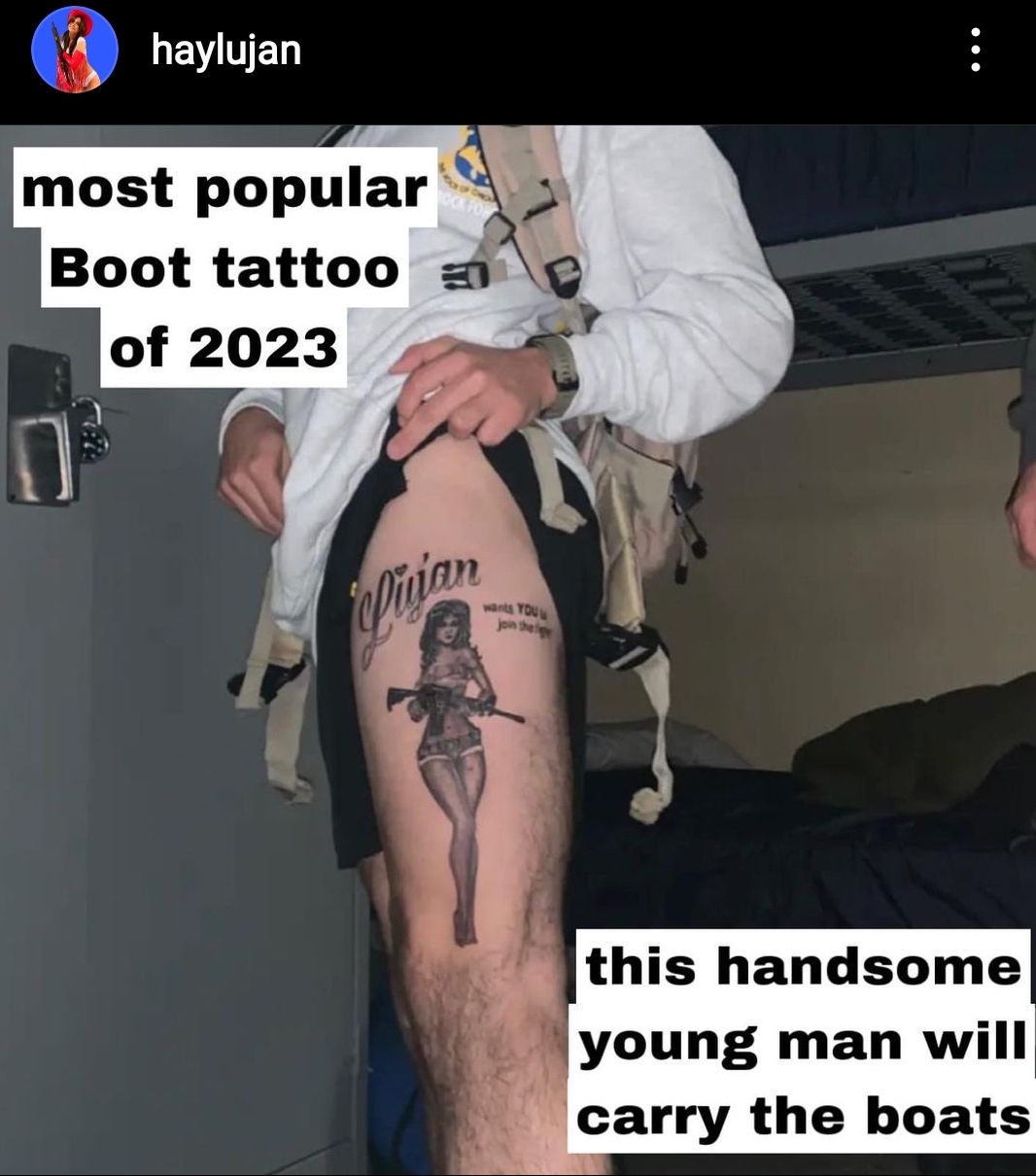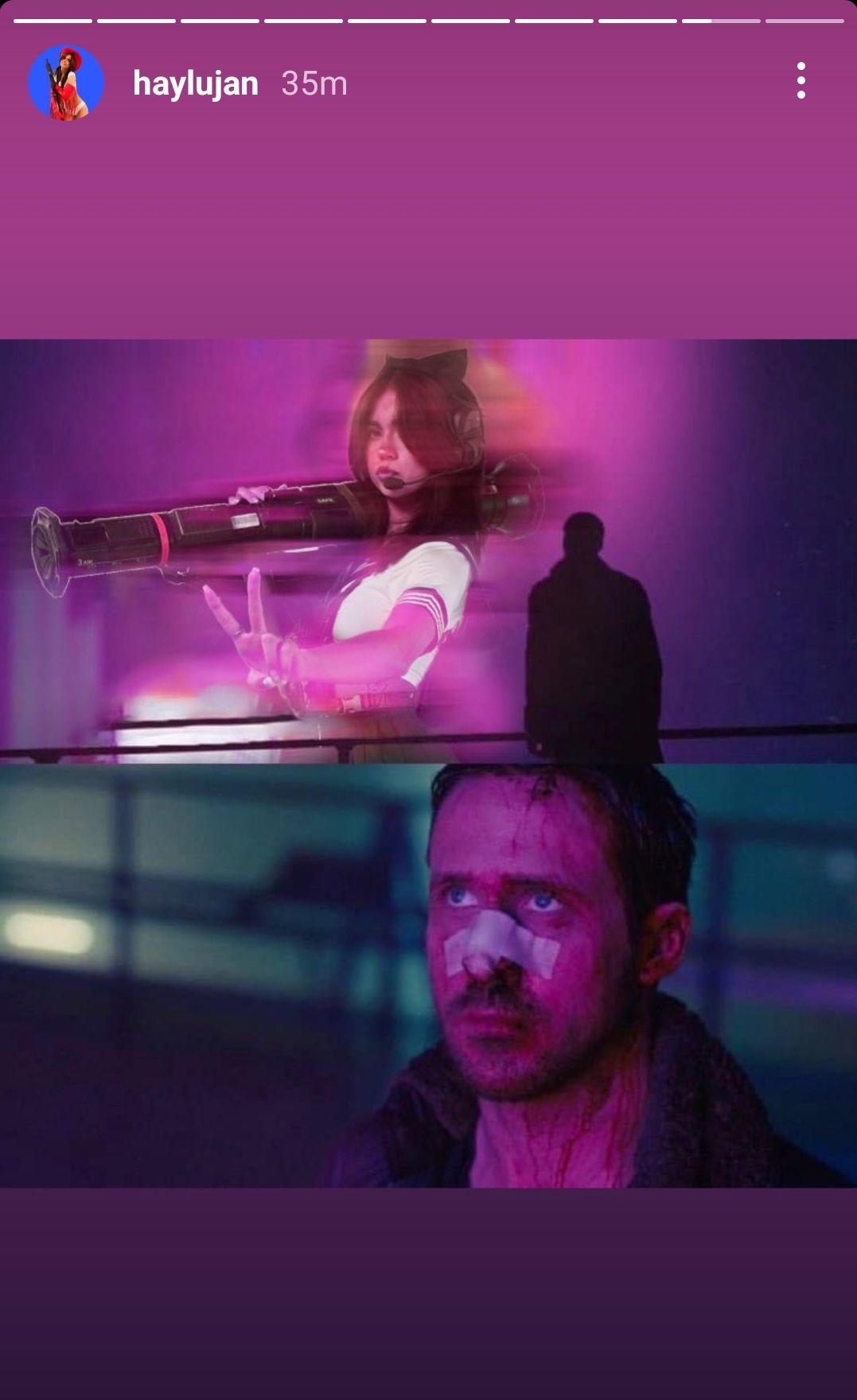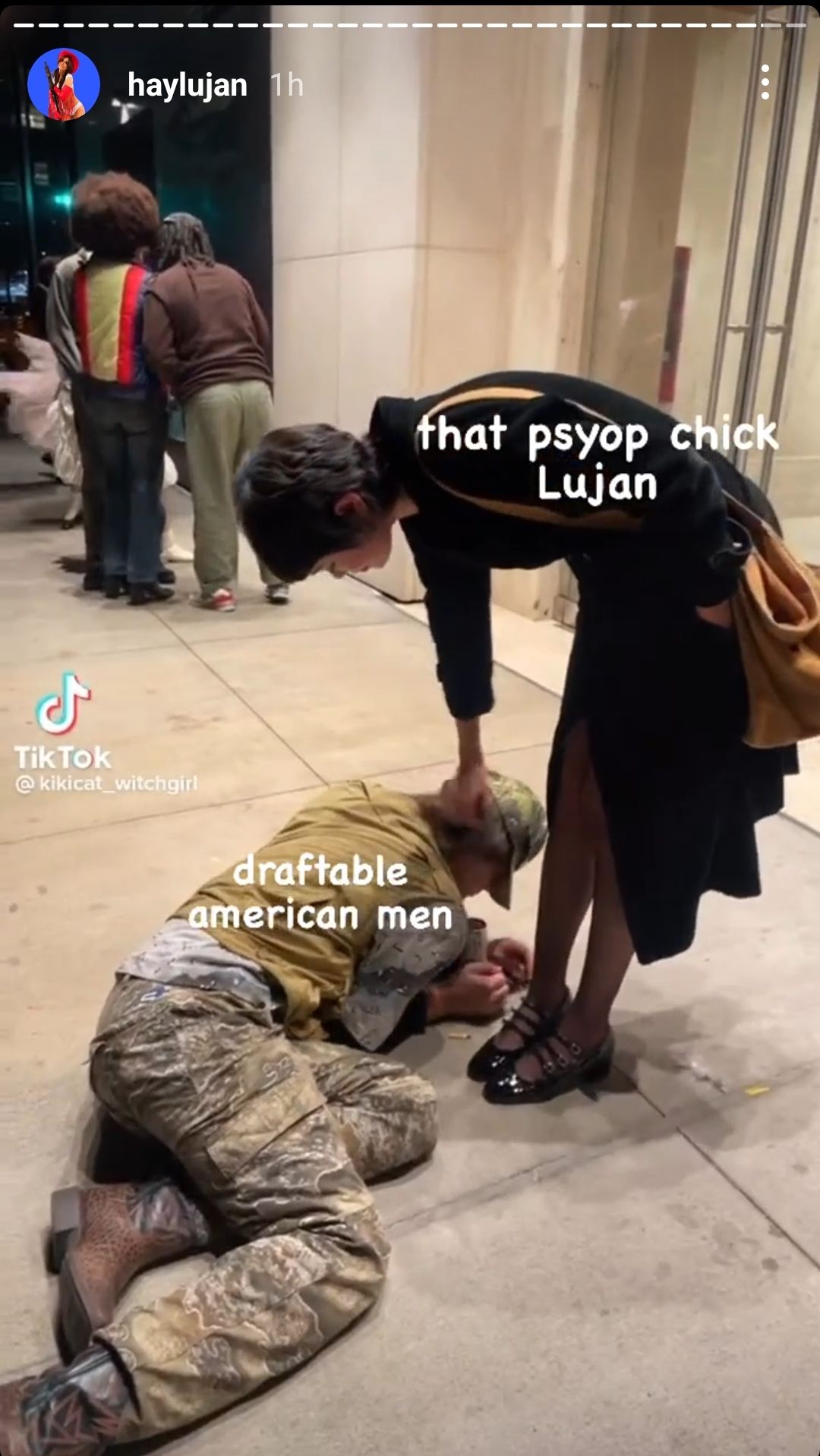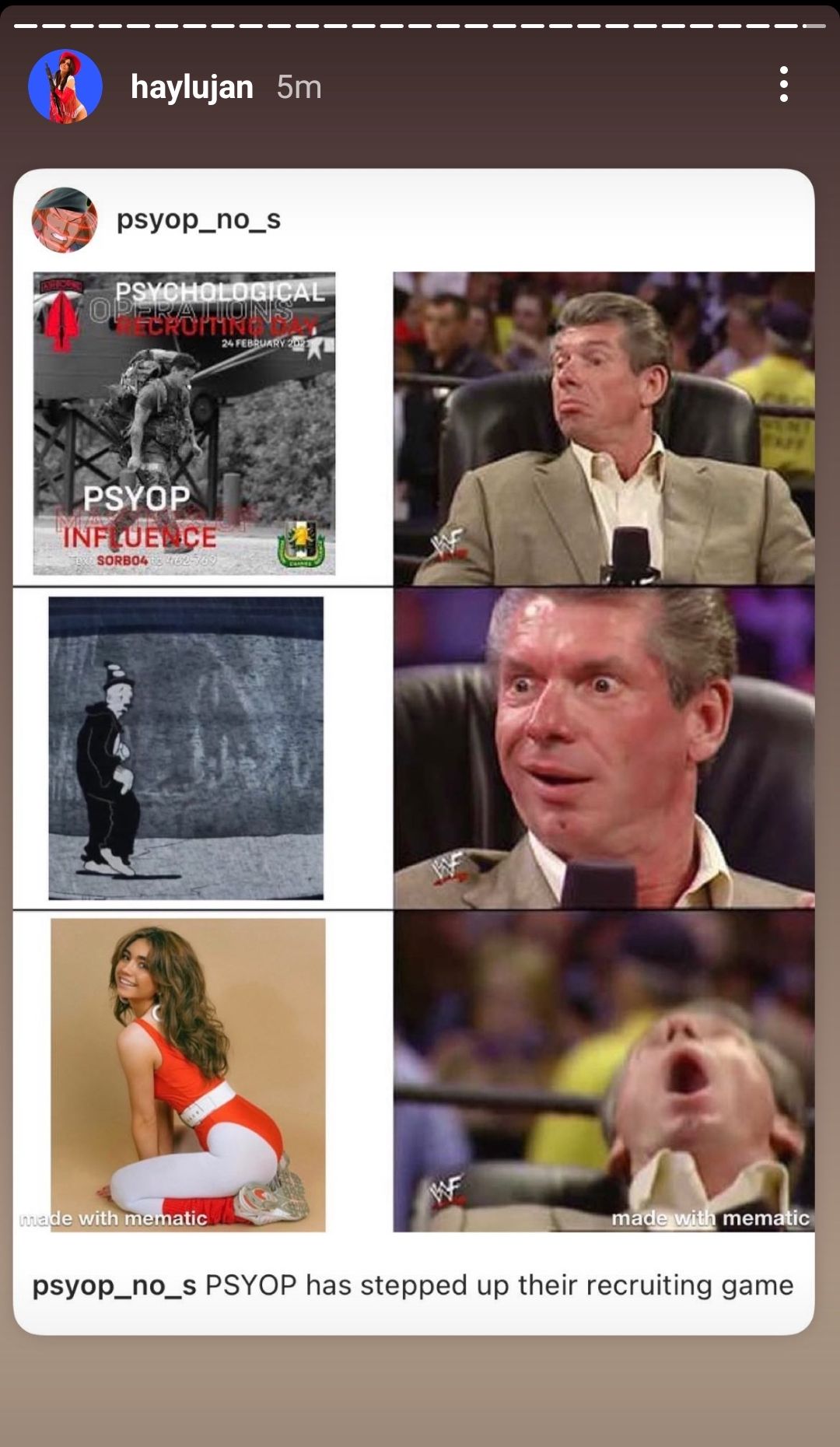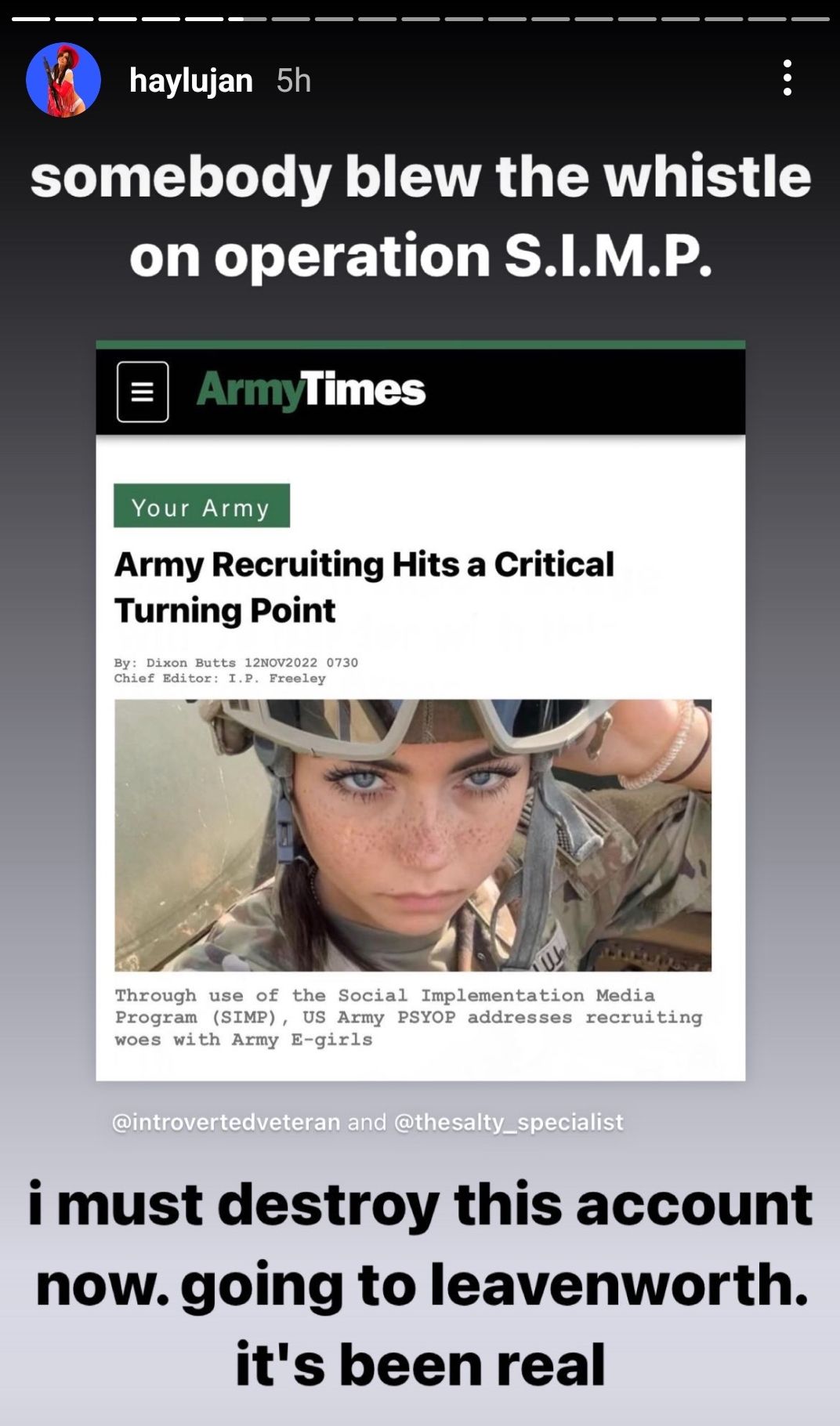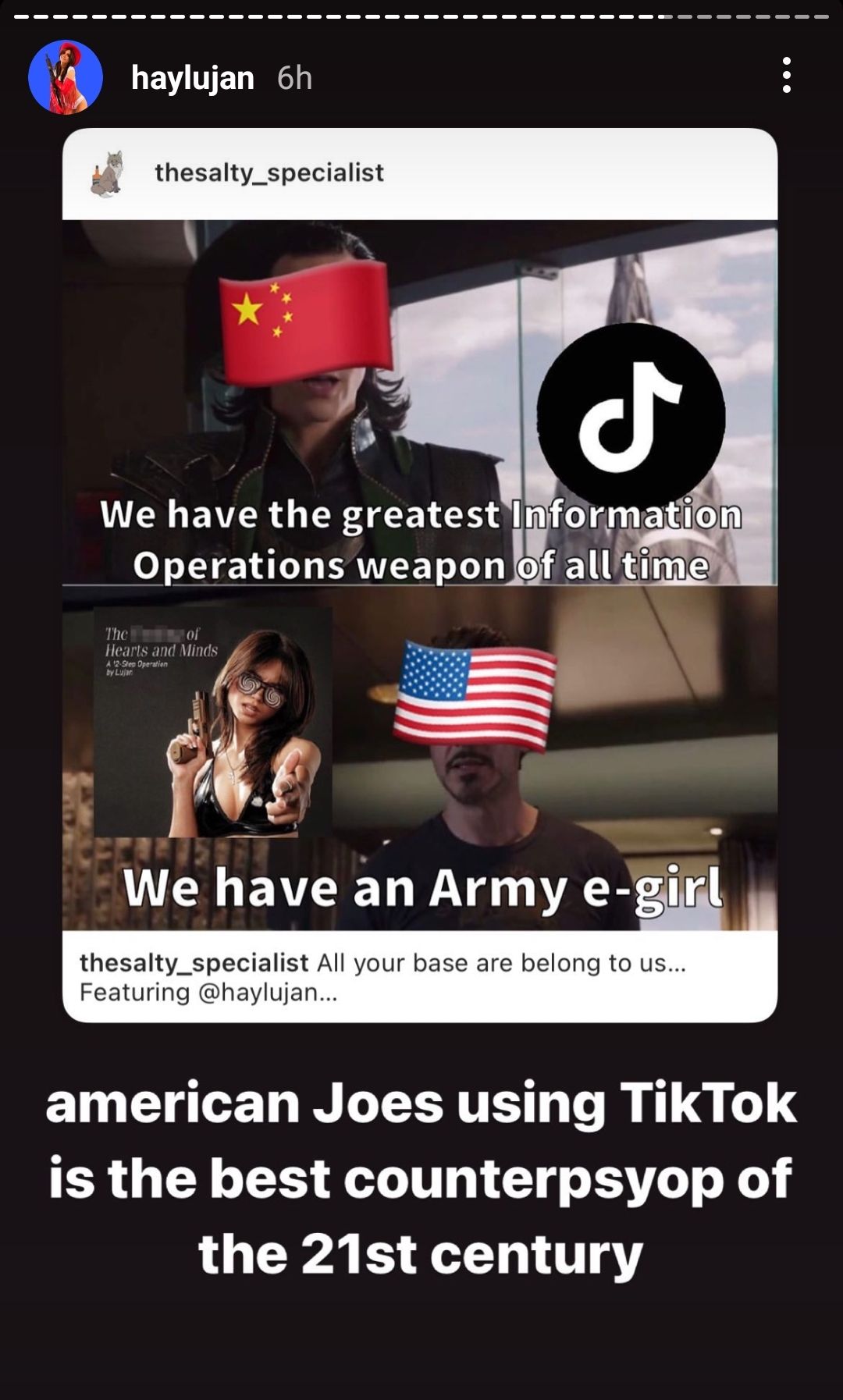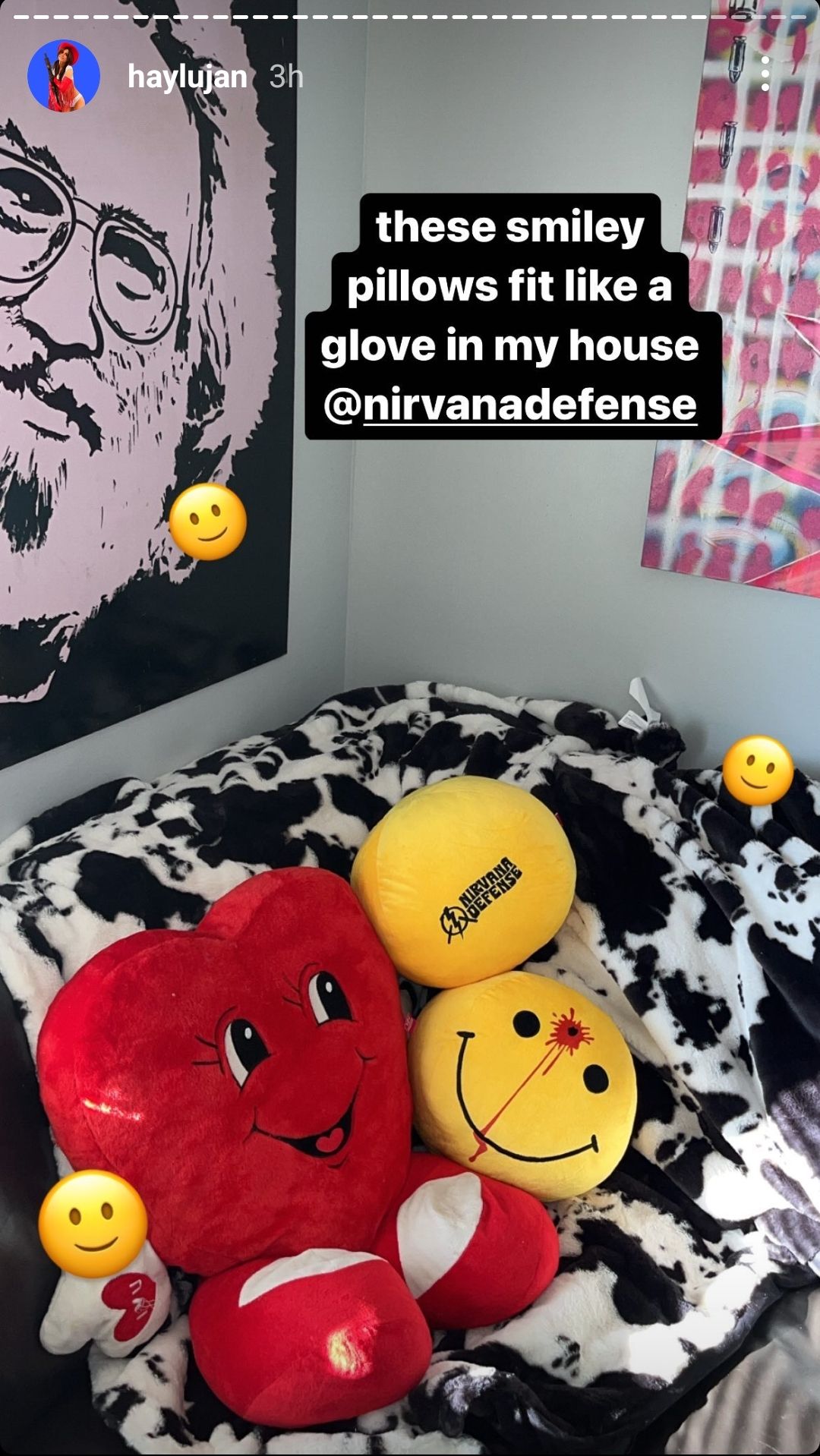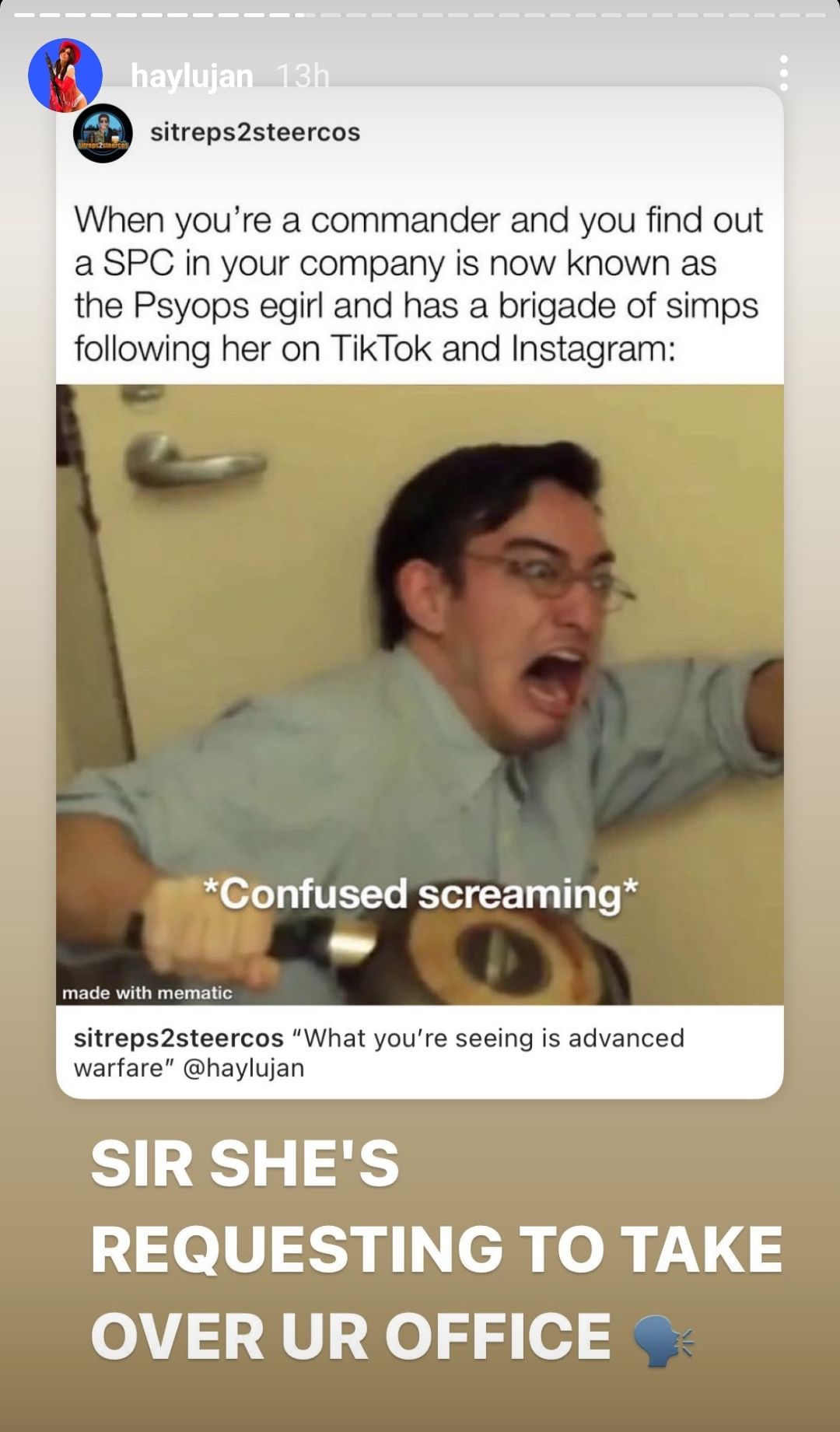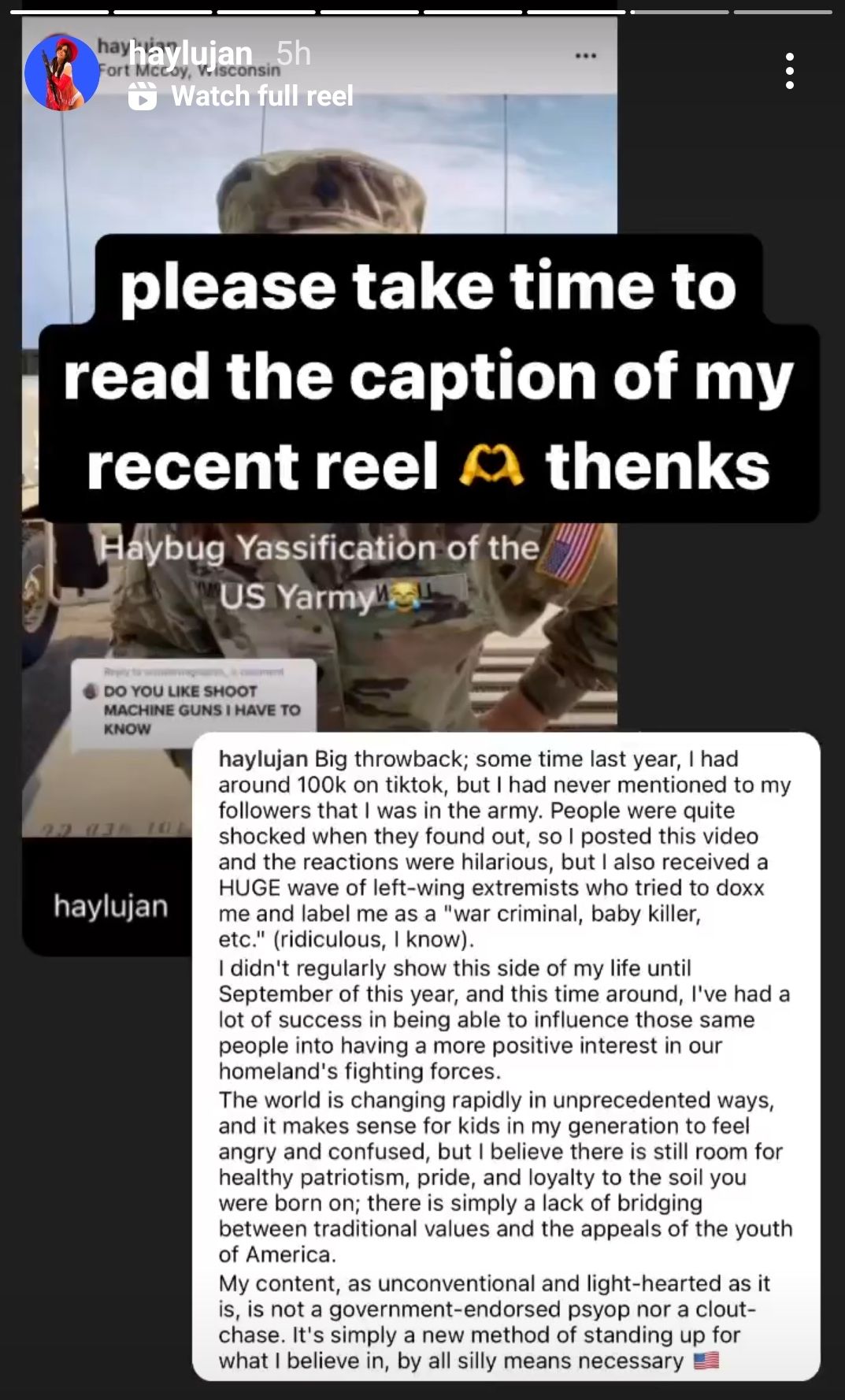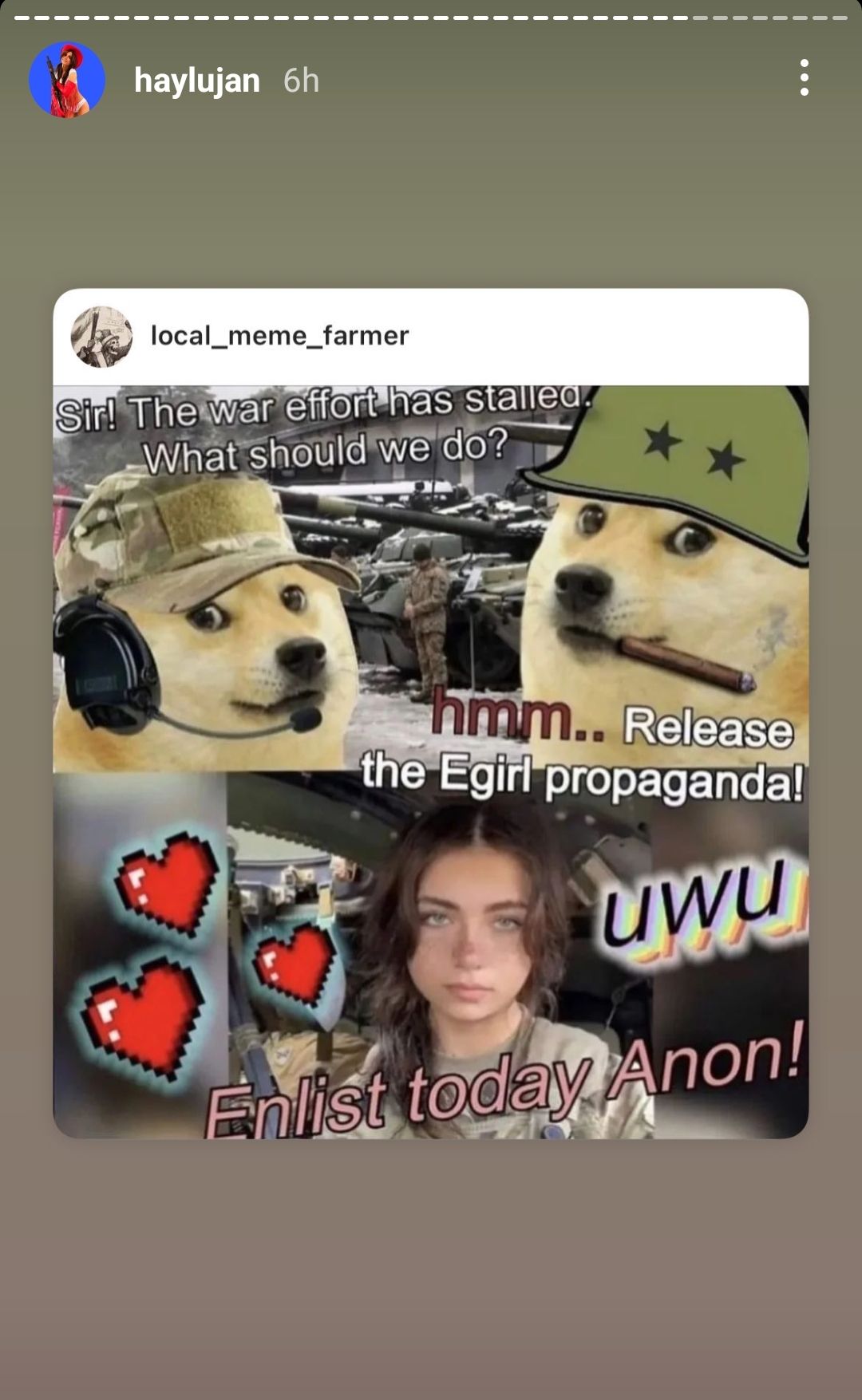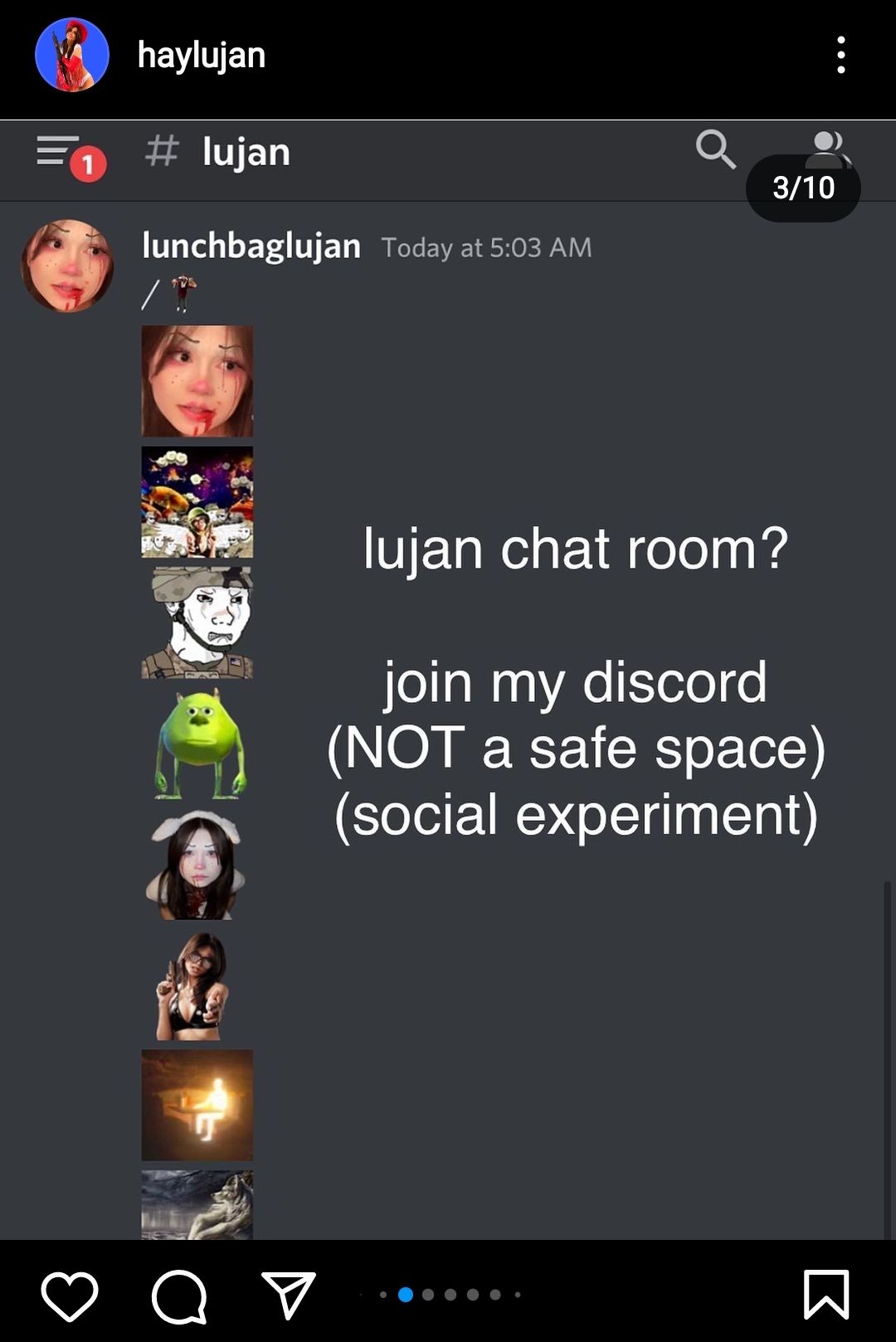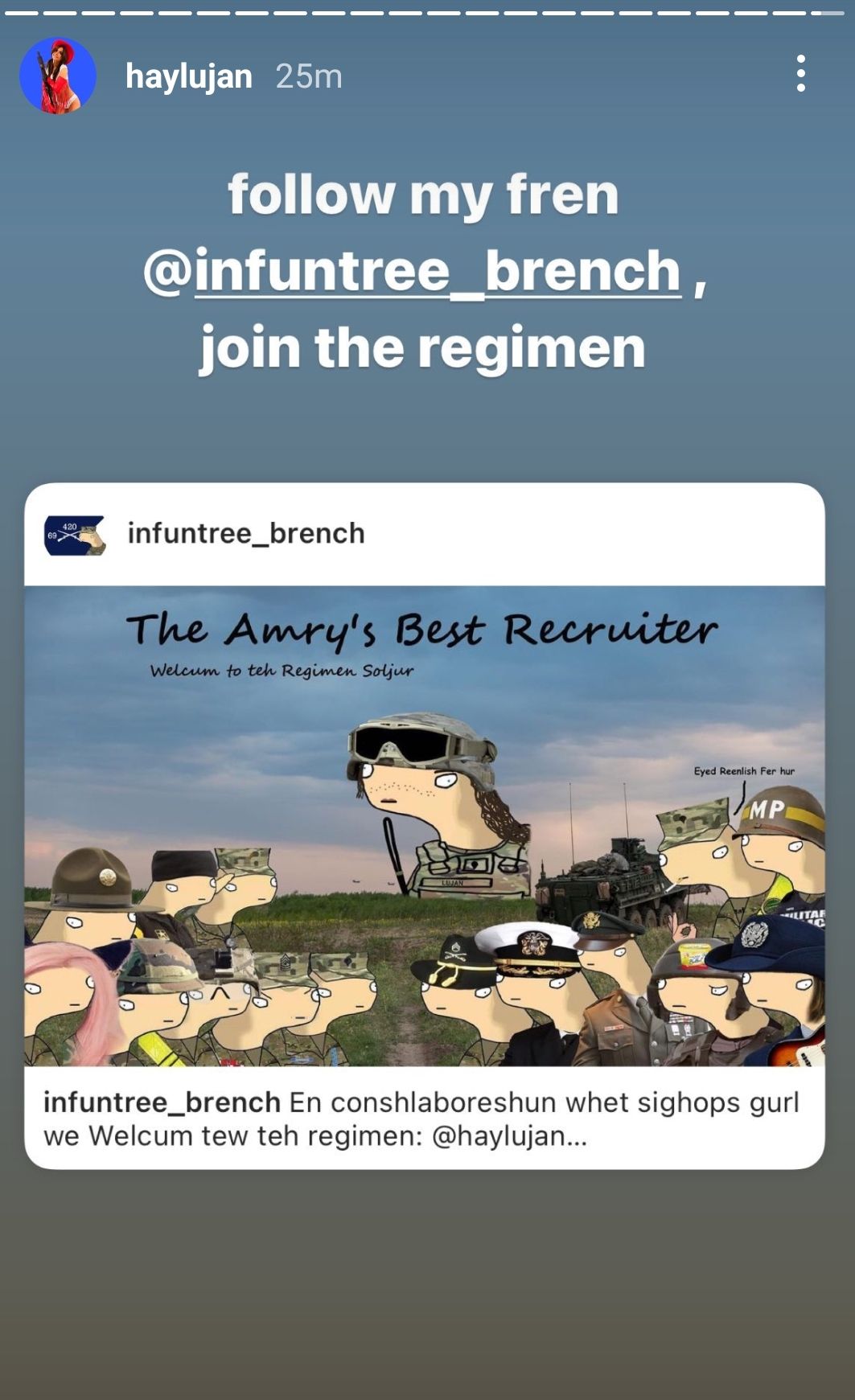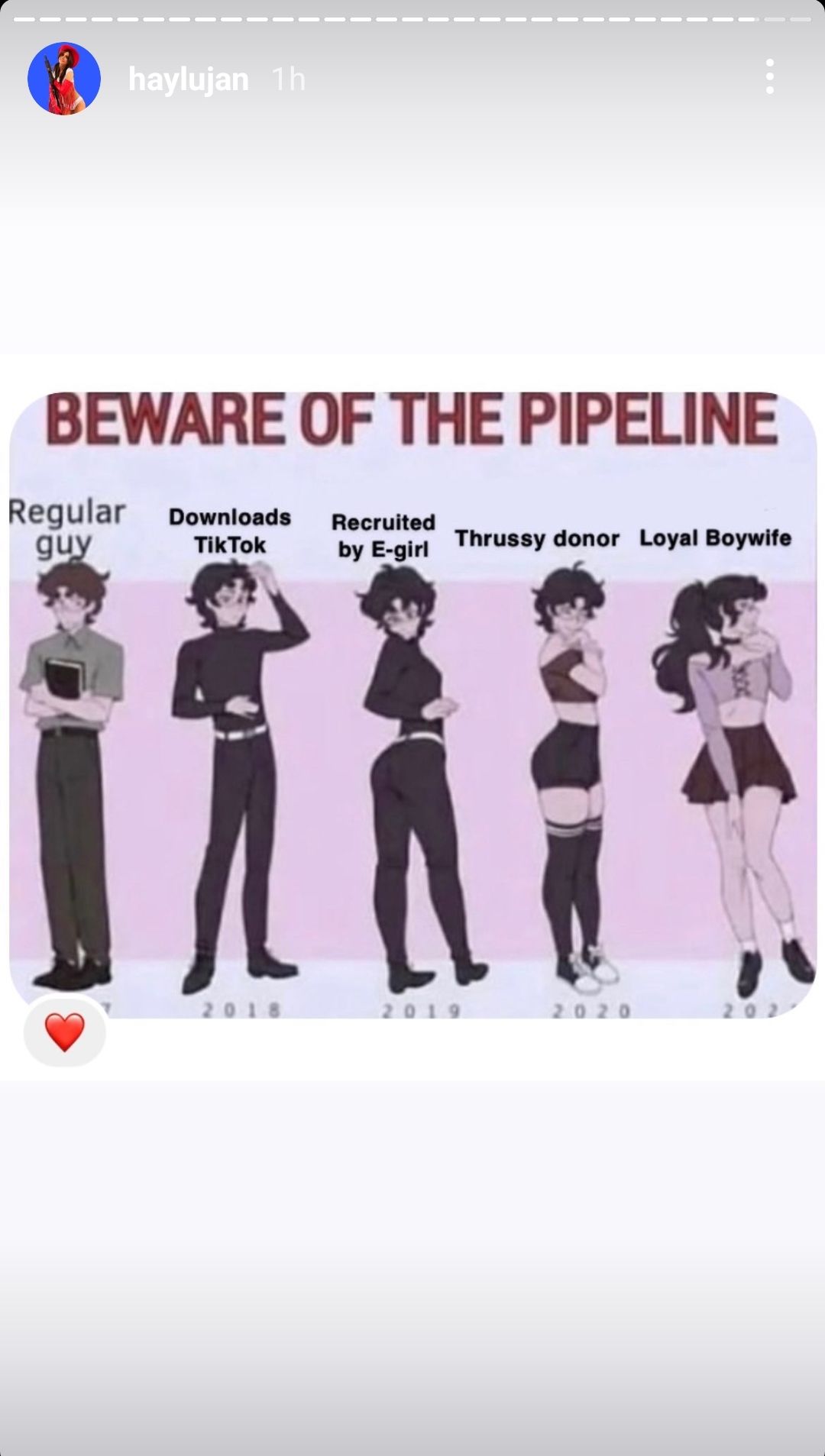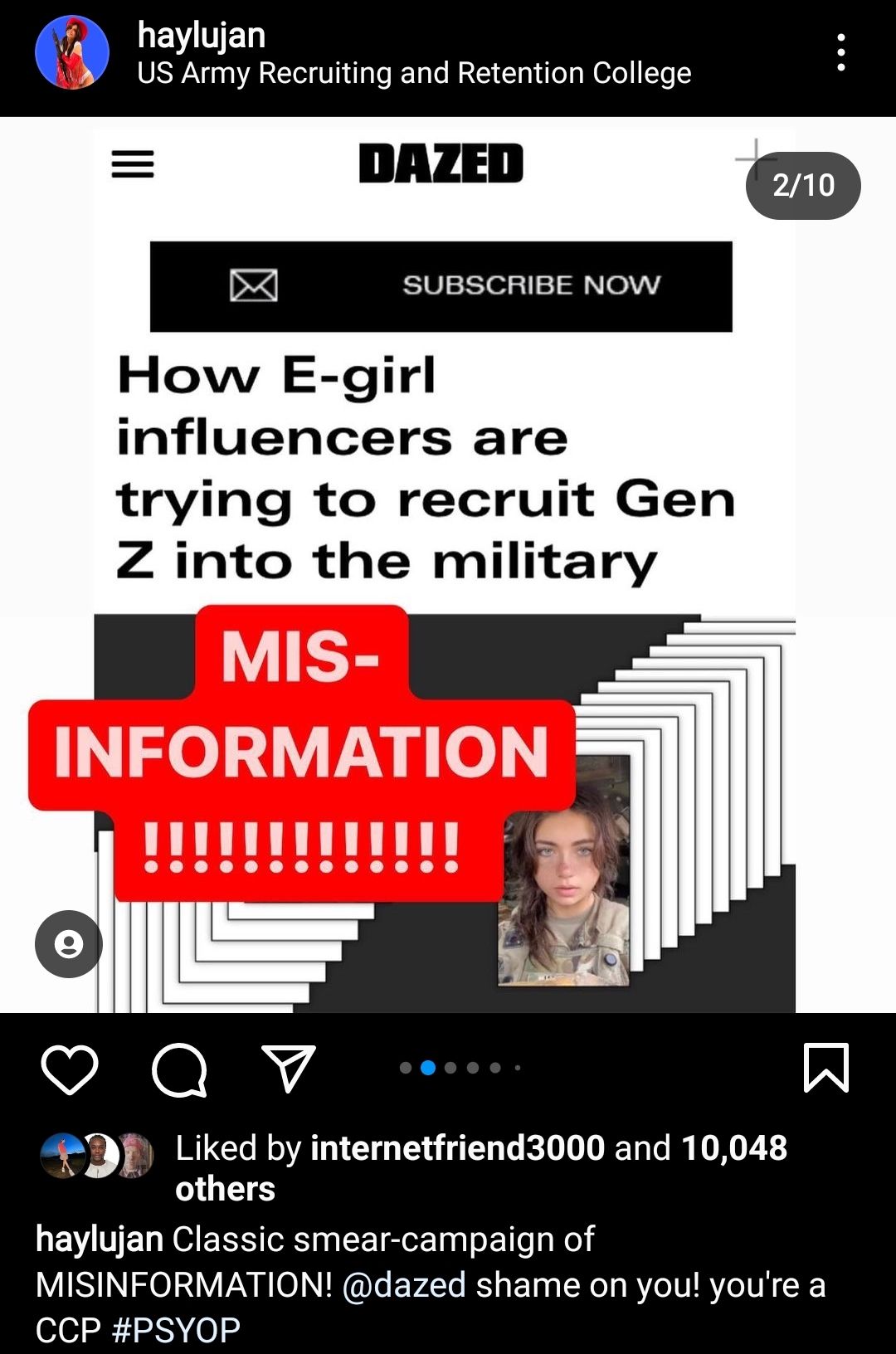“Because Physical Wounds Heal”
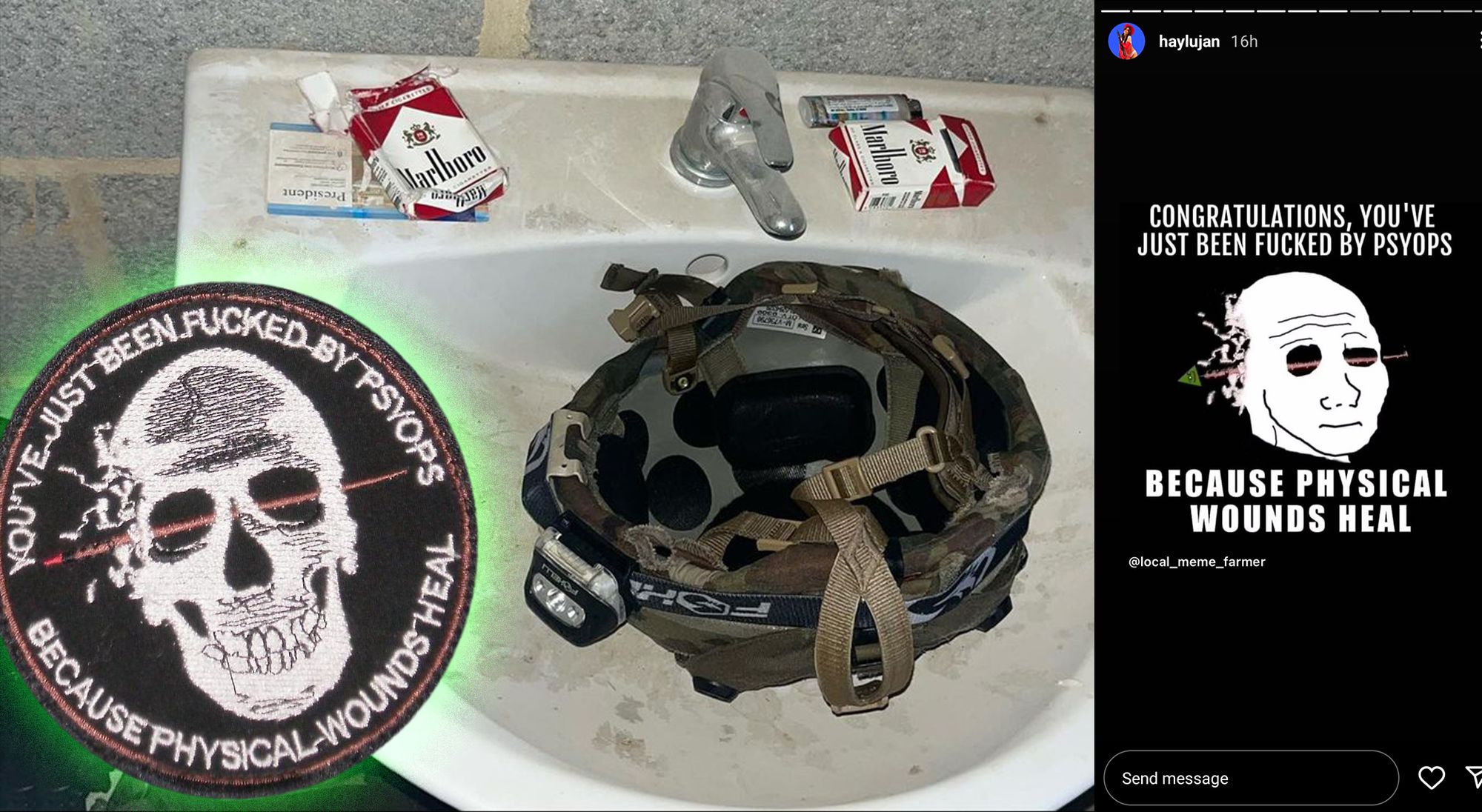
The Psy-Op Realism of an Active-Duty E-Girl's Post-Ironic Memetic Propaganda + Gen-Z Recruitment Woes, Žižek's Obscene Ideology of Military Culture & We Are All FEDs Now.
by Jak Ritger
Suggested pre-read: Politigram & The Post Left 2018 by Josh C
Saber Junction geotag, a tactical helmet with clip-on headlight upside down in a dirty sink, crushed Marlboro reds pack flank the counter. As if we have respawned inside a dream of war, it’s a simulation: a version of life in the military that is mediagenic. Zoom out a bit, we are inside the helmet of Hailey Lujan (pronounced loo-han) – social media’s hottest new active-duty influencer. But Wait! There is a twist, she is not just your average UwU tacticool fatigues-posting baddie with trigger discipline, or hunking meathead , @LunchBagLujan is in training as a Psychological-Operations Specialist. Does HayLujan’s virality signal a political shift underfoot? What is a Psy-Op and can I inoculate myself? I dove into the shifting uncertain state of Psy-Ops to try and uncover answers only to find more questions. To get a clear view of the situation, let's back up and get some context for the sense of paranoia that permeates almost all online spaces.
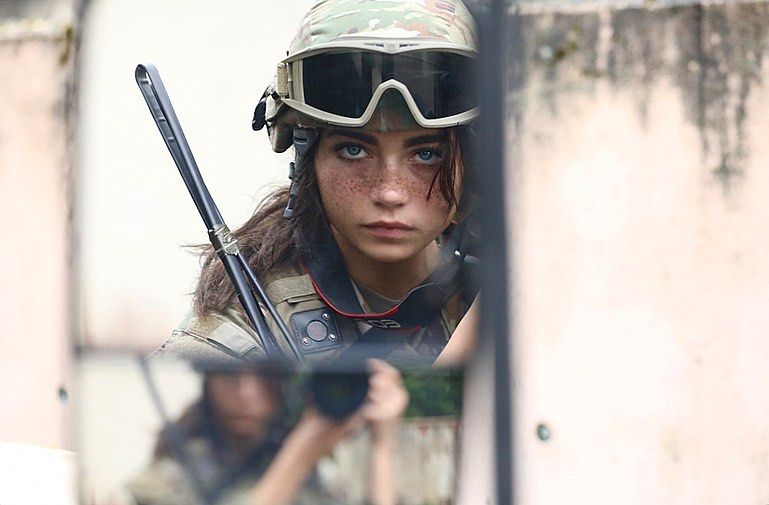
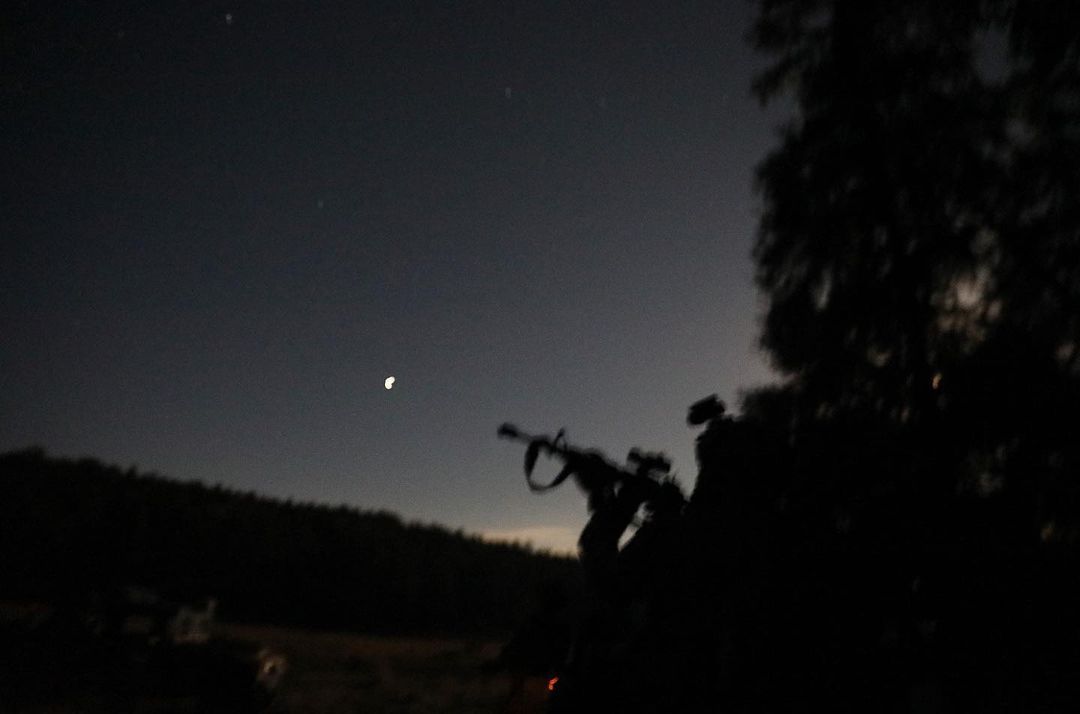


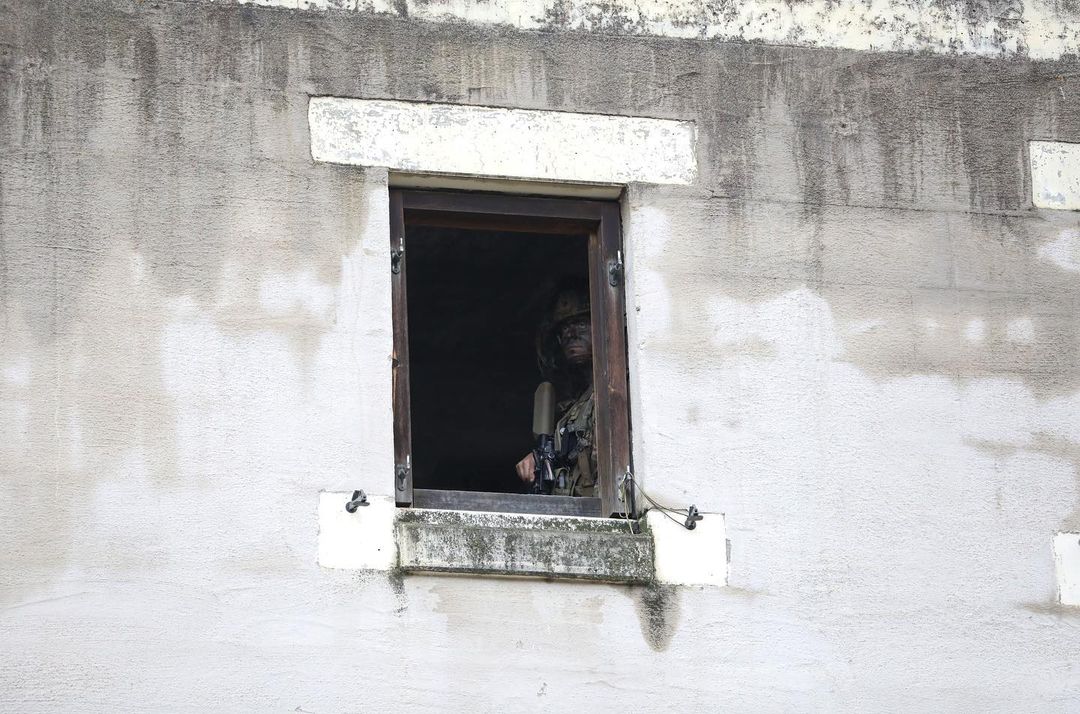
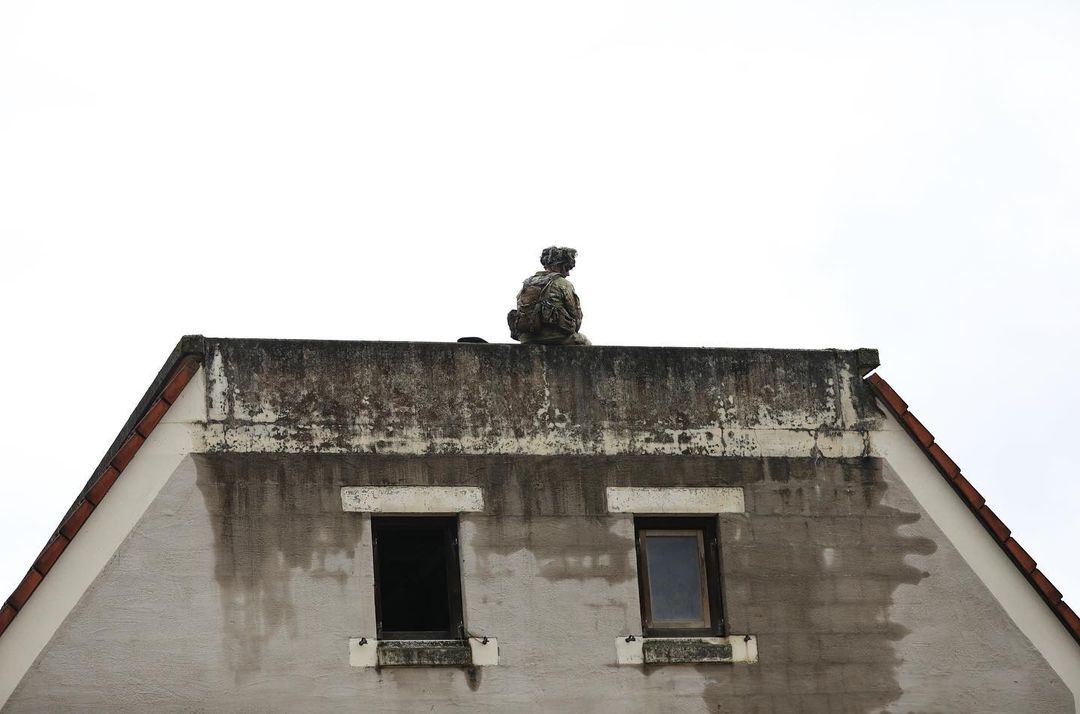
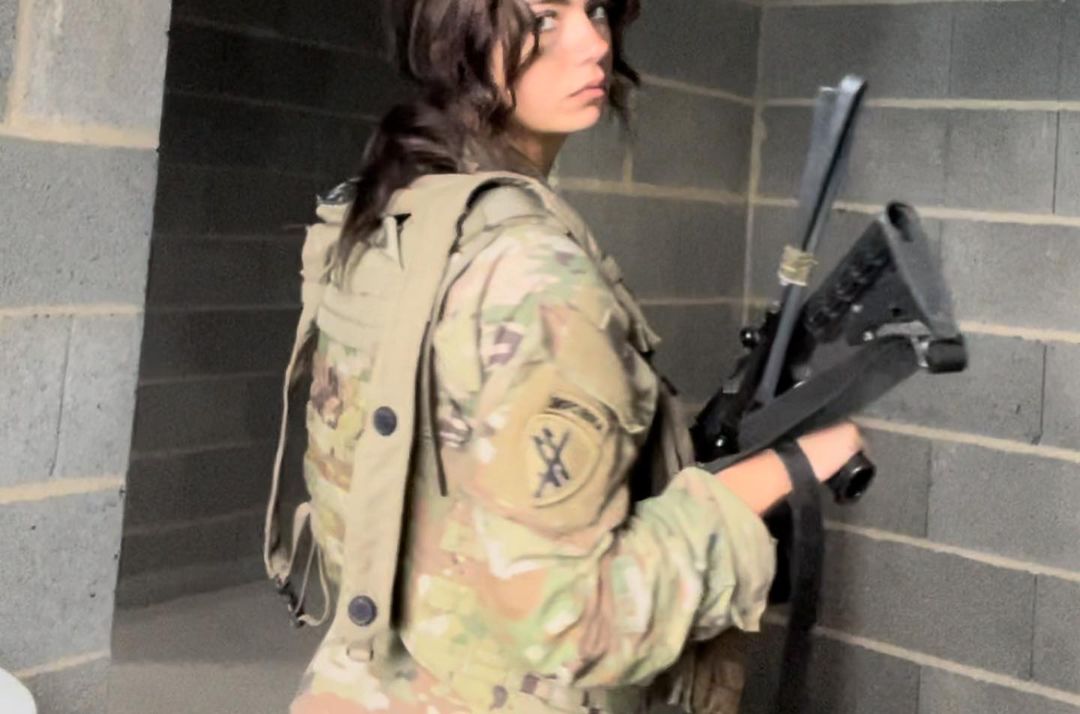
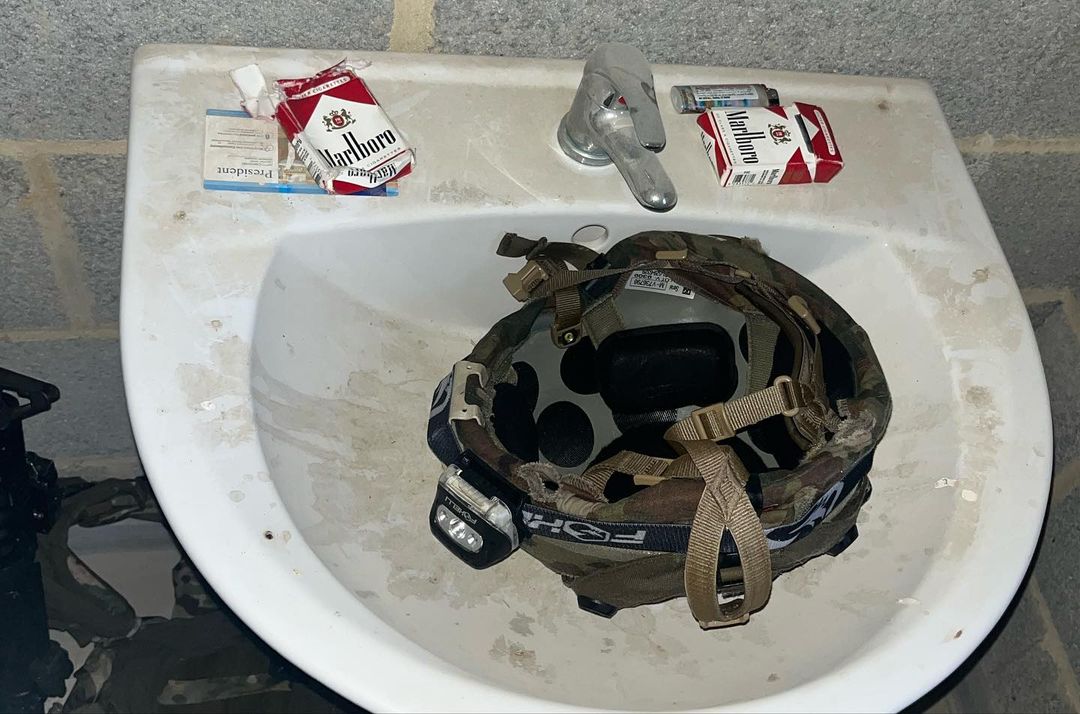

In the radical online political meme circuit, the most common line of attack is to accuse a fellow poster of being a “Fed,” ”Federal Agent,” or a “Glowy” member of the Alphabet boys: F.B.I. - C.I.A. - N.S.A. - D.O.D., etc. They glow bright from the radiation of a clandestine military mission. The feeling of having a personal FBI handler watching your every move drives this accusation. This feeling has existed since people started interacting with chatrooms. The seminal essay on para-sociality gone awry, “Pandora’s Vox (1994)” by the late OG blogger, Humdog, concludes with a gesture towards a peer-2-peer surveillance feeling:
“when i left cyberspace, i left early one morning and forgot to take out the trash. two friends called me on the phone afterwards and said, hummie your directory is still there. and i said OH. and they knew and i knew, that it was possible that people had been entertaining themselves with the contents of my directories. the amusement never ends, as peter gabriel wrote. maybe sometime i will rant again if something interesting comes up. in the meantime, give my love to the FBI.”
This awareness of being watched by the authorities and also watching each other is called “surveillance realism.” In the hyperactive world of online politics and memes, the character of your own personal FBI agent makes for great content. But, nevertheless, no one who considers themselves radical would suffer the insult (or threat) of being badjacketed as an agent, a FED or a Psy-Op… until now.
Enter @LunchBagLujan. In the summer of 2022 Hailey made a switch. She had amassed a large following on TikTok over a couple of years through the usual attractive TikTok content: travel, friends, outfits, dances, jokes, hair tutorials. Through this time she had made occasional video remarks on her active-duty status. These TikTok videos were irreverent, funny and played up the allure and boredom of military life. Then, last summer, suddenly the #MilTok posting began replacing almost all of the “normie” content. The ramping up of this content along with the ensuing blowback and counter-counter-reaction propelled her account into bonafide virality. From there, she launched an Instagram account to capture and funnel attention into fundraising campaigns for veterans and co-branding merch opportunities (TikTok platform restricts these efforts.) Early on in this rise to nano-celeb status she revealed her training as a Psychological Operations Specialist. This sent Theorygram, a loose network of instagram accounts concerned with critical theory and fringe politics, into an uproar. She was branded the “Psy-Op E-Girl”
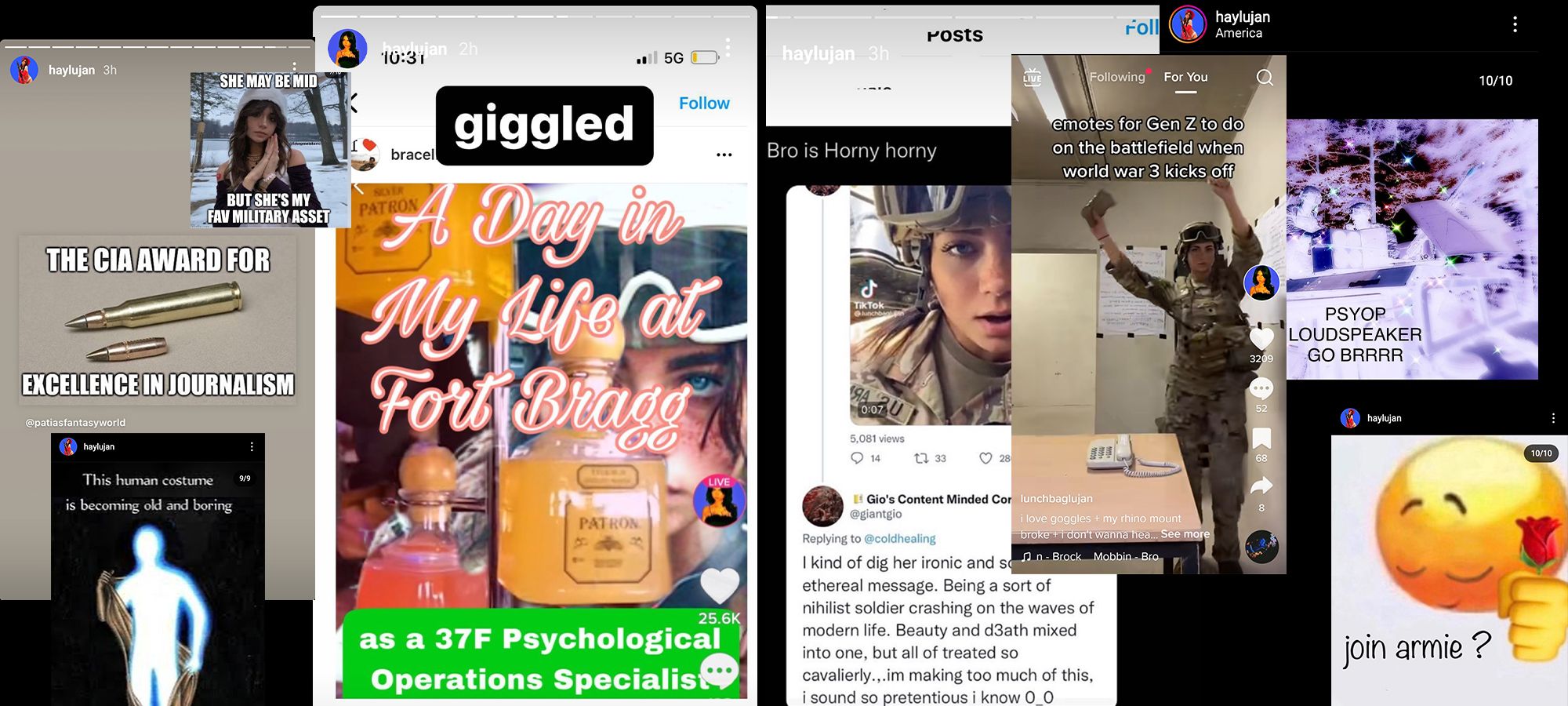
There were posts calling Lujan an op, jokes about ‘me and the boys’ getting recruited to fight in a war and wondering “where's Lujan??” and attempts to break the spell of a hot girl in a military uniform by tapping the screen and commanding viewers to “wake up.” Whereas past influencers in this position would have perhaps pushed past the controversy, trying to clear the air and divert attention away towards other content, Lujan instead leaned into this revelation and owned the label of being a Psy-Op specialist. In doing so, Hailey Lujan successfully recuperated the anti-establishment currents of post-irony memes and the latent paranoia that characterizes online life. The fallout from this development is reconfiguring the political orientation of fledging meme accounts and geopolitical powers alike.
I say this in jest, partly. I do not want to overstate the stakes (it's just social media posts after all) but I do think this evolution from “Surveillance Realism” to “Psy-Op Realism” is novel and joins up the disparate contradictions of Gen-Z online culture, namely a lack of meaning or possible revolutionary action during climate collapse and the condition of growing up in the most heavily policed and advert-saturated online experience yet. This tension between the absolute need for action and the impossibility of such plus the desire for perfect politics and the escalation of wedge issues have produced the sensibility of Post-Irony. In this condition, there lurks a pervasive paranoia of all politics and deep distrust of authority. Post-Irony is colored by a sense of nihilism for the future; one where political solutions are completely acquiesced by previous generations' failure to act, instead doubling down on social media spectacle. Post-Irony means the only way to engage politics is through ironic critique; through memes we can make meaning. In this way, Post-Irony sensibility acted as a cultural inoculation against indoctrination by political cults. Instead funneling youth into new political fringes or creating one’s own approach. As a byproduct, Post-Irony created a firewall against military enlistment and American exceptionalism in online culture.
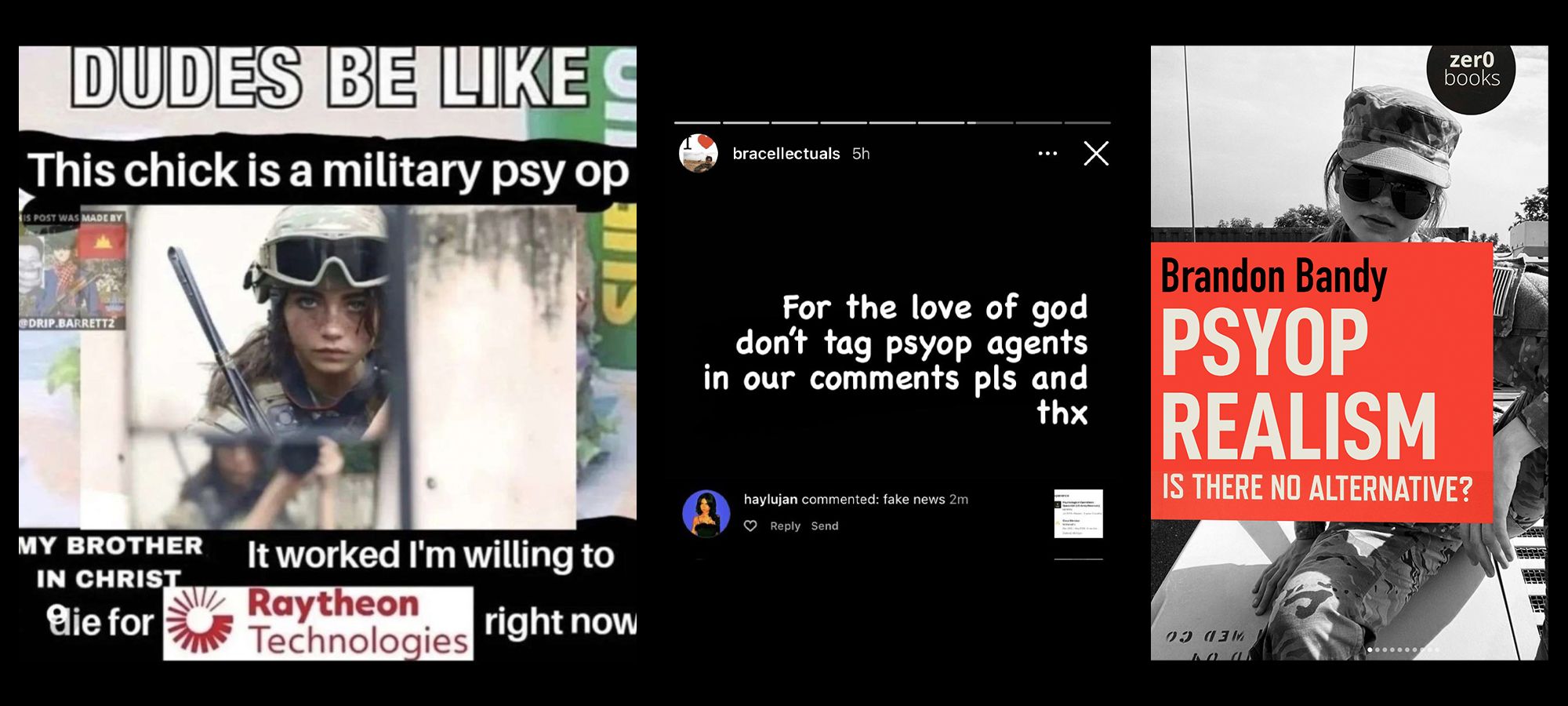
Recruitment Woes
The Army is having a very difficult time recruiting Gen-Z. 2022 saw record shortfalls in recruitment numbers, the biggest dip since volunteer-only service began. A confluence of factors are to blame: Covid-19 shutdown the physical spaces on which recruitment relies. The military had difficulty transitioning to an online recruitment strategy, seeing aforementioned friction in online culture as well as instituting stricter guidelines for social media possibly in response to active-duties speaking out on partisan issues . At the same time, many would-be recruits failed to meet physical or psychological fitness requirements for service. As the labor market tightened, many went into private contracting for better pay and less risk of death or injury. The bonus of having college tuition covered post-service became less enticing as more and more firms started similar programs during the labor shortage of 2021-22. Even McDonalds will send you to college after a couple years of enlistment. The strategy of harsh economic conditions pushing youth into armed service in order to escape poverty no longer seems to be working, as these harsh conditions have made youth unfit for service. The broken social contract, made painfully clear during Covid, undermined jingoistic nationalism that called previous generations to the mission. Pivoting to STEM might be one solution, along with a new desperate-seeming strategy of automatic JROTC classes at low-income public schools.
In the online sphere, the military faces a number of challenges in reaching Gen-Z. For one, the main social media of choice, TikTok, is off limits, as it is a Chinese firm. The D.O.D. looked to gaming and Esports to close the recruitment gap, striking up a partnership with Activision Entertainment’s Call Of Duty in 2019, but this partnership did not last. As news broke of systematic discrimination against female workers at the videogame company, the Army distanced itself and dissolved its partnership. Perhaps, the early indicators were not promising and the scandal was used as an excuse to end it early: Twitch streams with Army-sponsored E-Sports teams were routinely raided and trolled with questions about war crimes (banning this commenters goes against 1st amendment rights as it is a gov agency.) Discord groups supporting the Army’s team also became a target for trolling. The new strategy is to directly support individual livestreamers, thus outsourcing the moderation problem.
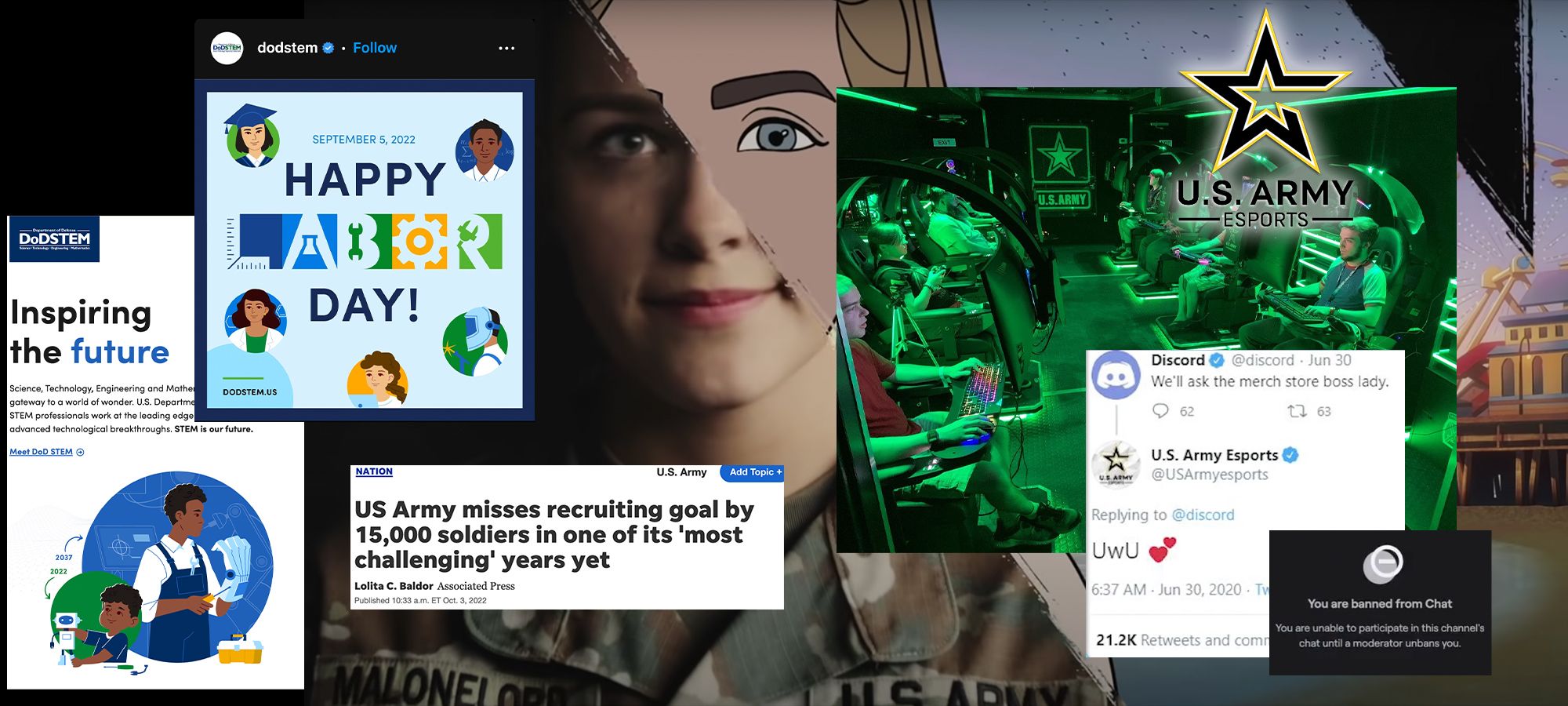
The legacy strategy of mass-media recruitment seems to be breaking down as well. The Army collaborated with Hollywood by lending equipment, vehicles, and funding in order to promote patriotic war cinema, inspiring young men to take a position in the armed forces. Today, this dynamic has become virtualized: war movies inspire bloodlust but instead of heeding the call to duty and enlisting, the youth can instead simply play Call Of Duty and live out Battlefront fantasies from the comfort and safety of their basement. This is an ironic twist, in that these war simulation games were first developed to train soldiers and then later as a mass-media-marketing tool, they have now enclosed the urge to take up arms inside the simulation. At the same time, warfare becomes more and more virtual with remote drones strikes doing much of the heavy lifting, thus requiring these same virtual skills of gameplay to be devirtualized into actual killing games.
Against these challenges Lujan seems to have cracked the code. She bragged "when the Army spends $100 million on advertisement each year just to get ratio'd by a 21 year old girl with a tiktok” (ratio'd = outperformed.) How exactly did she do this? Tiqqun would say that young attractive people with relatable style that make funny videos are the products of Jodi Dean’s Communicative Capitalism. Or perhaps, supernova viral content makes it inevitable that we will see at least one nano-influencer emerge from every profession and station in life. Today, it happens to be the U.S. Army Military Psy-Ops Specialist who is unofficially making content inbetween shifts. In fact, TikTok as a creative medium was shaped by a famous veteran, Bella Poarch. More recently, Natalia Fadeev blew up as the Israeli Defense Force "Gun Waifu" in a much more overt display of support for national politics than Lujan. More comparable are U.S. armed forces hotties like Garett Nolan, Luc Bongiovanni, Kayla Salinas or guntuber, Garand Thumb who seems to do more content than job as active-duty. In terms of raw recruitment numbers by the currently enlisted, Thumb is probably more consequential than Lujan. Outside of service, there are a slew of gun influencers that have been employed by weapons manufacturers in order to circumvent Instagram’s no weapons advertising policy as well as brands like Black Rifle Company that drive support for armed services.
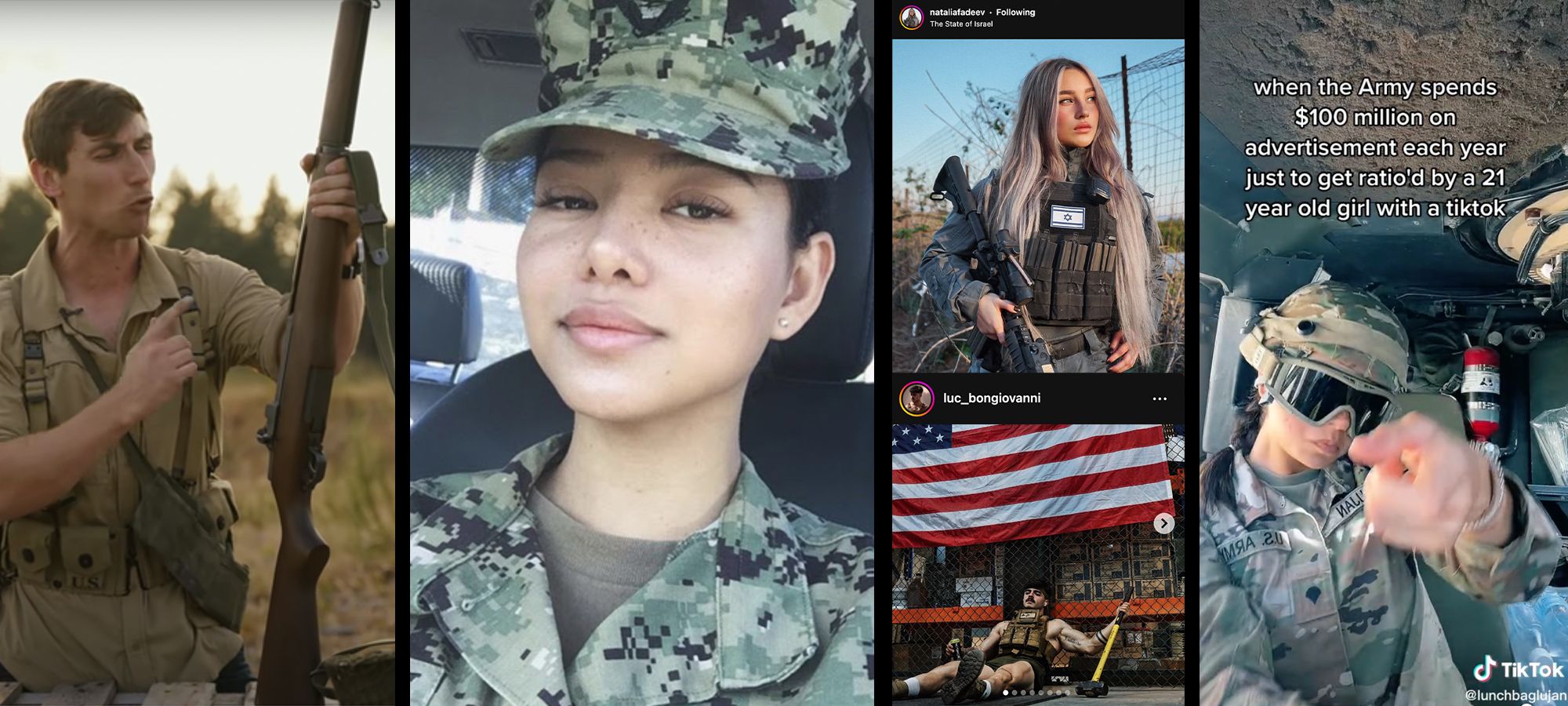
But, whereas former recruitment narratives are aesthetic: join the military and wear all this cool gear, Lujan is making a political argument through the strong defense of the paranoia-inducing Psy-Op agent: taking responsible for influencing populations, a smart soldier using soft skills of manipulation and intimidation to sway crowds. In fact, the manipulative brainwashing element of Psy-Ops is central to Lujan’s allure. She calls herself the “Glow Goat,” a reference to Glowies, slang for Federal Agents online that “glow” if they touch water. She utilized hypnotizing spiral glasses for a flirtatious calendar photoshoot. In a response to an AMA, Lujan defended and explained her role as a Psy-Opper while expressing frustration with Gen-Z groupthink (her characterization of left-wing anti-war sentiment.) Could Lujan be the better recruitment strategy for Psy-Ops that the military is in need of?
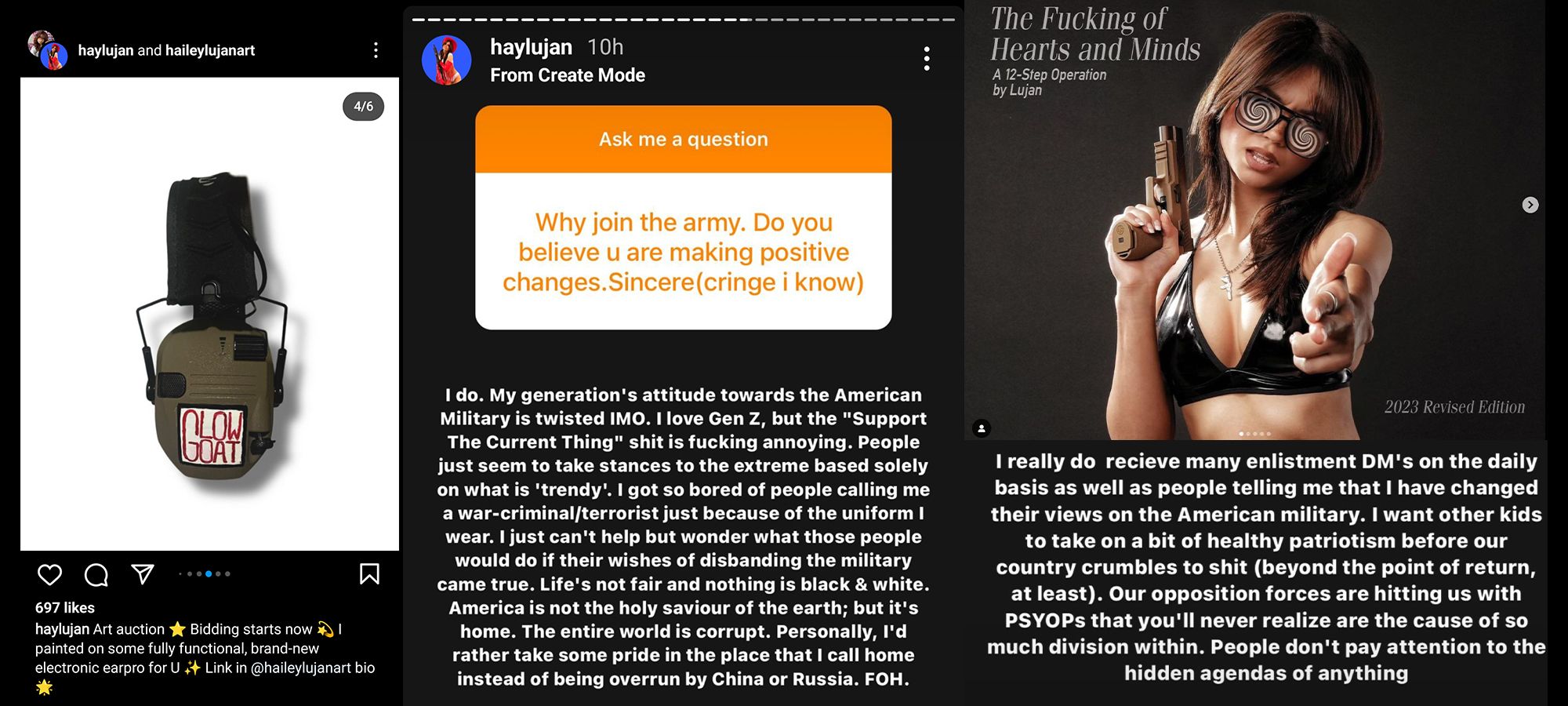
Obscene and Ironic Ideology
In Slavoj Žižek’s analysis of the film “Full Metal Jacket” in A Pervert’s Guide to Ideology by Sophie Fiennes, he describes how military discipline functions in practice. In excess of simple rule following, there are two ways that military ideology bolsters itself: the obscene over-identification with order as seen through the drill Sergeant Hartman’s lewd marching chants and conversely the ironic distance that soldiers like "Joker" or the characters of M.A.S.H. take in their personal lives. In both instances, the official ideology of "The Proud, The Few" or "Not Self, But Country" is made into a caricature or subverted to create distance between the Superego of power / official ideology and the individual tasked with carrying out orders. This distance allows for the soldier in order to carry out their duty and function effectively within the force. In this way, the obscenity and ironic detachment are crucial to the reification of the ideology of military discipline. When this distance breaks down the individual embodies fully the ideology of power, leading to self-destruction, as seen through the character of Pvt. Leonard Lawrence taking his own life while acting out his training routine in Kubric’s film.

In the same way that obscenity and irony constitute unofficial culture of the military, like ideological byproducts; Psy-Ops make up the unofficial secretive mechanics of power, like byproducts of geopolitical goals. Also referred to as “Influence Operations” or “Active Measures,” Psy-Ops exist in three modes depending on the public's intended awareness: White Psy-Op is the obvious pamphlet drop, Gray Psy-Ops discreetly influence local news media and Black Psy-Ops pushing black propaganda (damaging rumors, libel attacks, exciting ethic or partisan divisions) or astroturfed support campaigns. Where-as Hard Power, war crimes and genocide leave evidence to prosecute, Psy-Oppers intend to leave no trace and function on multiple levels to undermine opponents. In this way, Psy-Oppers constitute the whispering mouth of the military force, in the politician’s ear and behind the radio broadcast. Subversive influence operationalizes modes of traditionalism or transgression in order to promote its mission of narrative dominance. Psy-Ops move out horizontally as booklets are passed around, rumors are spread or news framings are repeated, memetically propagating. The obscene, the ironic, the personal or the political are all possible tools in the development of Psy-Op products.
As explained in a podcast, "PSYWAR" by the 8th Psy-Ops Group, the job of the deployed Psy-Op Specialist is to assist a squadron on the ground in messaging to local populations. This role is closer to marketing and design than it is to the shadowy maneuvers of the CIA or FBI. Nevertheless, the tactics used can be eery, uncanny, manipulative, or a banal barrage of de-escalatory messaging. In a short film "you can do the macarena to any song" (2022) by artist, Abbey Pusz, one such deescalation tactic is revealed: The Macarena. U.S. forces occupying Afghanistan are documented teaching the popular dance to local youth as a way to pacify and imbue goodwill. Pusz then reveals that this same tactic made its way back to the U.S. and was implemented by National Guard forces in order to pacify Black Lives Matter protestors as curfew approached. It would seem that just as military weapons, drones and armored vehicle technology was sold back to local police forces, so two were the social technologies that developed during the Global War On Terror (GWOT.) It is of course coincidence then, that one of Lujan's favorite trending audio clips to use in videos softening the military's image is sampled from "The Macarena" ... right?
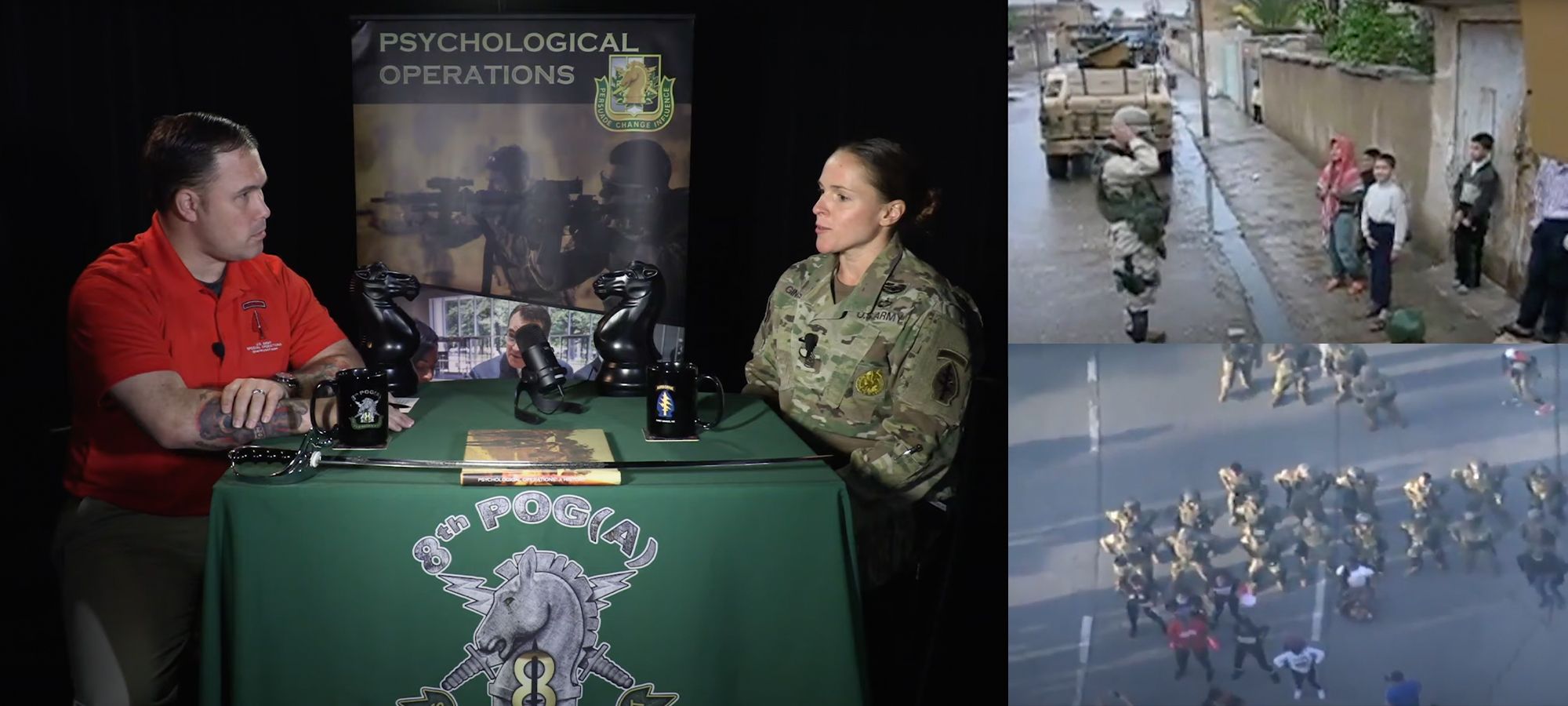
Exposing these operations comes with a sense of agency panic, a questioning of trust in figures of authority, questioning of ideology and mission. The photos of the torture of prisoners at Abu Ghriab during the U.S. war in Iraq are one an example of this. In his book, The Men Who Stare at Goats and later BBC series, "The Crazy Rulers of The World", Jon Ronson interviewed Abu Ghriab prison guard who was picture in "trophy photo" next to abused prisoner, Lyndie England, revealed that it was Psy-Ops specialists that staged the photos:
England : I was instructed by persons in higher rank to "stand there, hold this leash and look at the camera". And they took a picture for PsyOps and that's all I know ... I was told to stand there, give the thumbs-up, smile, stand behind all of the naked Iraqis in the pyramid [have my picture taken].
Q: Who told you to do that?
England : Persons in my higher chain of command ... They were for PsyOps reasons and the reasons worked. So to us, we were doing our job, which meant we were doing what we were told, and the outcome was what they wanted. They'd come back and they'd look at the pictures and they'd state, "Oh, that's a good tactic, keep it up. That's working. This is working. Keep doing it, it's getting what we need."
The working theory is that the photos were created to blackmail Iraqi commandants after release, in order to create informants against the insurgents. A losing strategy as these sadistic actions created more insurgents in the occupied country. We will most likely never know the true motives of what transpired and it is this questioning of reality that is an outcome of Psy-Ops. It is this sense of agency panic that characterizes so much of online life, and makes Psy-Ops an especially potent point of friction for online culture.
Psy-Op Realism
In cyberspace, Psy-Ops have begun to exert the same kinds of messaging and influence campaigns that previously found outlets in radio, print, and pamphlet. A recent Stanford study found many operations taking place across the globe. Most often taking the form of independent news operations on Facebook, that occasionally slips in propaganda messaging. This kind of content has limited reach, with most posts only reaching a handful of people. The most successful online Psy-Ops in the study were ones where the operator was not hidden, i.e. the military overtly attempted influence. It would seem that “honest” media in this sense does better online in a media environment designed to boost authenticity. It could also be that the poorly translated news pieces from puppet outlets are clearly spotted as low quality content. It is for this reason that I think we are going to see more avatars of Psy-Ops like Lujan as this approach has way more credibility and influence.
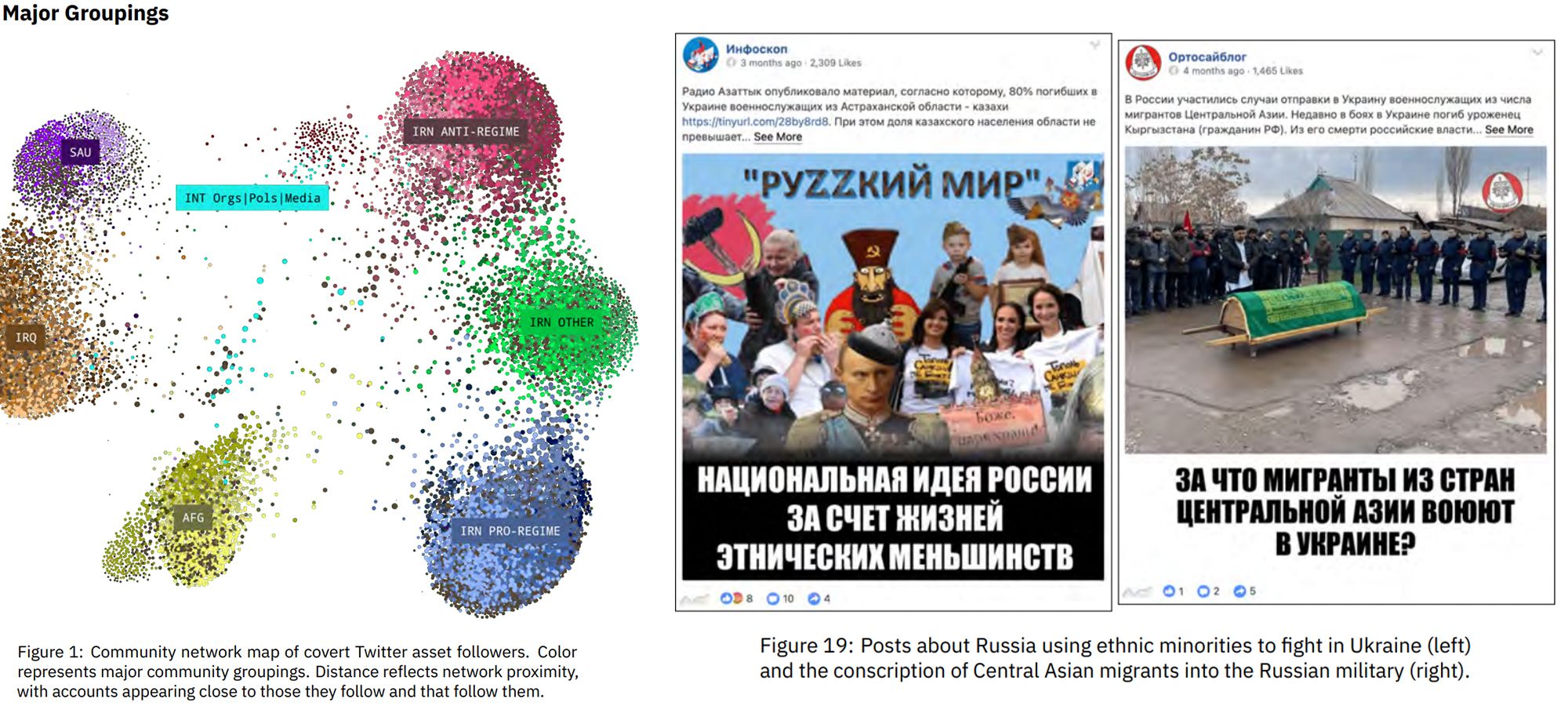
In many ways, it seems that the U.S. military’s online Psy-Ops are catching up to Russia and China’s digital strategy. For the past couple years, the media has been (poorly in my opinion) analyzing the threat of Russia's “disinformation” campaigns and election influence. The threat is made to feel omnipotent and present and came to a head when the contents of Hunter Biden’s laptop were leaked to the tabloids. Social media sites blocked the linking of news articles and censored anyone posting the salacious content. The justification given was that the materials were obtained through “hacking” by Russian agencies. The threat of foreign Psy-Ops became the reason for the restricting of domestic journalistic freedoms, i.e. influencing the narrative. In the wake of this incident, we have perhaps entered into a new paradigm marked by intense suspicion and conspiracism, where the term “false flag” is used widely — we are entering “Psy-Op Realism.”
We are caught between geopolitical posturing, unable to trust the information we receive as factual or some sort of manipulated data in order to intimidate an opponent. The intended audience of these Psy-Ops are opposing forces (Russian recruits, Ukraine defenders) but the civilian news-reader is caught in the crossfire of this information warfare. Last year's Russian invasion of Ukraine came with reports from media in the west that the invading army was poorly supplied and destined to fail in a matter of weeks. As this story was not yet born out in reality, distrust in official sources was seeded - a similar dynamic was witnessed in the public health messaging failures during the Covid-19 pandemic. Coming from the other-side, Russia's official line of 'denazification' as justification for its aggression resurfaced devastating traumatic histories for people in the region. This weaponized rhetoric activated the worst kinds of reductive discourse. In both instances we can see how targeted messaging as part of a Psy-Op campaign works to soften the enemies resolve for war.
The use of tactical media and weaponized discourse is prevalent online, where everyone has some sort of agenda; pushing an advertiser's message or augmenting one's politics for the benefit of algorithmically awarded attention. Our paranoid distrust of platforms seems to be confirmed over and over again. The Twitter Files reveal the level of access to moderation team that the FBI enjoyed before Elon Musk’s acquisition of the company. Edward Snowden’s leaks showed the extent of wholesale data capture the NSA was engaged in. Recently, Proud Boys leader, Enrique Tarrio was revealed to be an FBI informant. A plot to kidnap a Governor Gretchen Whitmer in 2020 was hatched and developed by a group of eighteen people, five of which turned out to be informants or undercovers. These instances of heavy FBI involvement with far-right groups leads us to wonder, are these groups being operationalized for Psy-Ops? And toward what end? While, at the same time, Far-right conspiracy thinking skirts responsibility for the embarrassing Jan 6th action by calling it fake Psy-Op orchestrated by the deep state.

Existing online is to be aware of the multitude of ways one is being contorted by macro-forces and interests unknown. Schizophrenia Disorder when expressed online can creates the hyper-paranoid character of the “Targeted Individual” who finds community in online forums to commiserate about the legions of undercover agents "gangstalking" them as black helicopters circle above. As online culture becomes more and more niche and esoteric, we are all turning into something like Targeted Individuals. The knee-jerk reaction when someone asks a personal question on a private discord is to label them as a Fed with a glowing reaction. Any sufficiently political space has to assume that there are Feds monitoring the speech. Nevertheless, accusing one’s comrade of being an undercover or “badjacketing” is itself a tool used by infiltrators to divide and slow the progress of activist organizing. This should be avoided. The only way out of this paranoid spiral is to simply assume that everyone is a Fed, even yourself, and then proceed with business as usual. Under Psy-Op Realism: Everything is a Psy-Op and Everyone is a FED. I am sure someone will accuse me of being a FED for writing this blog post.
As private internet spaces and meme channels or “The Dark Forest” become awash in Psy-Op threats both real and imagined, Clearnet and mainstream channels have begun to metabolize the legacy of Psy-Ops on a massive scale. The true crime podcast craze set-off by Serial Podcast has developed into a full ecosystem of investigative reporting on a spectrum of hard-hitting to chatting reblogging. Investigation of Psy-Ops and military history is a logical progression of the genre. In fact, season two of Serial Pod followed the complicated story of returned P.O.W., Bowe Bergdahl. A couple recent such podcasts have turned their spotlight towards Psy-Ops: Wind of Change attempted to get to the bottom of a CIA rumor about how agents co-wrote the Scorpion song that became the anthem of the fall of the Soviet Union. Even though the series debunks this claim it ends up feeling like a reputation wash for the agency, portraying cunning field operatives putting together massive soft power plays that dissolved political hegemonies from within. WBUR Endless Thread podcast’s “Madness: The Secret Mission of Mind Control and The People Who Paid The Price” tracked down and interviewed victims of the CIA’s MK ULTRA experiments who underwent prolonged drug induced sleep and memory wipes at Montreal’s McGill University. One of the most disturbing revelations from the five part investigation was that Dr. Ewen Cameron was inspired to begin his human experimentation after auditing the trial of Nazi scientists at Nuremburg. Even after stories of suicides, lost time, broken families, the series stresses that the handful of declassified reports on MK ULTRA (about 50) is a small portion of the Psy-Ops and social experiments going on in the cold war period. There is so much we still do not know. Another true crime hit podcast, The RFK Tapes attempts to debunk conspiracy theories surrounding Robert F Kennedy’s assassin, Sirhan Sirhan’s missing time and reports of Rosicrucian brainwashing. But, after running down every lead the reporters are still left with questions and the theories remain unresolved while Sirhan maintains his story after all these years. The true crime genre hinges on the desire to get to the bottom of a frightening story. This desire is heightened in a time of “Psy-Op Realism”: we struggle to verify top signal media framing and dive deeper to understand the hidden motives and political economies that shape our world. Even the term “Conspiracy Theory” was devised as a way to corral and cool investigative journalism in the wake of the JFK assassination by characterizing anyone not accepting the official story as a crazy kook.
In this context of massive online conspiracism and militarized information space, several artists are making work to make sense of “Psy-Op Realism.” Brandon Bandy used the term to title an installation at Phyllis Gil Gallery at UCR Art. The small white-wall gallery housed a fake wall displaying a real (but faked) installation. In the image are devirtualized artifacts of extremely politically charged objects. Viewers can break through the image to find an empty backroom, a gesture towards the hidden centers of power. Another work by Brandon Bandy, along with Rachel Jackson works through the difficulty of distilling the physicality behind media spectacle is the risograph book, "Higher Source." The two traveled to locations of the incendiary horrors of modern America on the west coast in order to photograph what remains in these locales. The banality of these images certifies our feeling that these events have been wholly consumed by the stories that have echoed out afterwards. What were we expecting to find at the empty In-N-Out Burger table that Ghislaine Maxwell was spotted at after Jeffery Epstein's hanging death? Reality leaves no trace now.

Directly addressing military influence, David Noel's work unravels the aesthetic and narrative fallout from the GWOT. A sleek Predator Drone levitates over a pristine Frutiger Aero landscape. The image is reminiscent of a default Windows computer desktop. The drone is stalking this virtual space, virtualizing war while bringing the theater of war into the personal computer den. On his Instagram page, @DN.USA, David catalogs shifts in military and weapons culture. Most uncanny are the overlaps between the aesthetics of the cute anime gamer with the hyper-nihilistic warrior mindset. It's something you really need to see to believe and exposes the space of militarism as uncertain and contested. Perhaps, a function of an artwork in the era of "Psy-Op Realism" is to trace and expose the impact of social engineering experiments. Tomi Faison's 16mm loop "First as Tragedy, Then As Larp" brings us to the steps of the Capital on January 6th, 2021. By capturing this protest action that was largely done for the benefit of livestream viewers remotely on film, Faison throws the entire event into sharp relief. The attempt to devirtualize this spectacle illustrates how unstable these Para-Real moments are. Psy-Op Realism is an impossibility, as once the fantasy enters physical spaces it dissolves into chaos.

"Because Physical Wounds Heal"
So what will be the legacy of the Psy-Op E-Girl? Lujan broke the fourth wall of internet paranoia and turned a spotlight to the byproducts of military disciplinary ideology: the obscene and the ironic distance. Given her success we are bound to see more active-duty soldiers take up the selfie camera and enlist as platform workers. And since it's not going away, we better learn how to live with or detour these dynamics. As army influencers move out of the #MilTok echo chamber and into more left adjacent cultural spaces, there is a culture shift bound to happen. We saw gestures towards this shift with CIA’s rebrand last year that gave the shadowy autonomous agency famous for torture and overthrowing democratically elected leaders a new identity as a high-tech cutting edge startup hiring diverse talent. The official YouTube page for the 4th Psy-Ops Group launched a similar style ad titled “Ghost in the Machine” that promoted the job as a cunning spy thriller adventure that utilizes theater, video production, and art for the mission. As the Pentagon courts young talent, the fashion industry borrows aesthetics from the military. Tactical gear has been a big wave for many years now but recent runway shows for Christian Dior and Balmain took the tacticool look to new heights of delicate strength. As these aesthetics become normalized and more mainstream (everyone has a pair of camo pants) the allure of death-drive #warwave content will perhaps lose some of its pull. Perhaps the success of active-duty influencers will de-incentivize their re-enlistment: maybe Lujan will leave the force and take up TikTok full time (although doubtful, she has said she will re-enlist many times) like Navy Vet turned full-time aesthetician, Jess.Indigo / Virgo Dreamcicle.
In fact, this aesthetic space is open for detournement, one example is Tacticool GirlFriend, a queer guntuber and IG personality who teaches her followers firearm safety under bisexual lighting. In the music world, Hyperpop demon, Dorian Electra created a viral campaign for a new record that utilized right-wing conspiracy a-la Alex Jones to funnel fans into a playful narrative pointing towards the history of gay rights activism and queer liberation. #DrinkTheWater instructed followers to consume tainted water that "turns the frogs gay" as part of Electra's "My Agenda" with the help of Pussy Riot and The Village People. On the activist front, in the wake of the George Floyd uprising, the left has begun to take up arms and return to the more militant stance of the Black Panther movement, the Not Fucking Around Caucus (NFAC) is one such group that has been building for years. At the same moment in 2020, a group of actors took up arms during a BLM demonstration as a media stunt and branded themselves "The New Black Panthers."
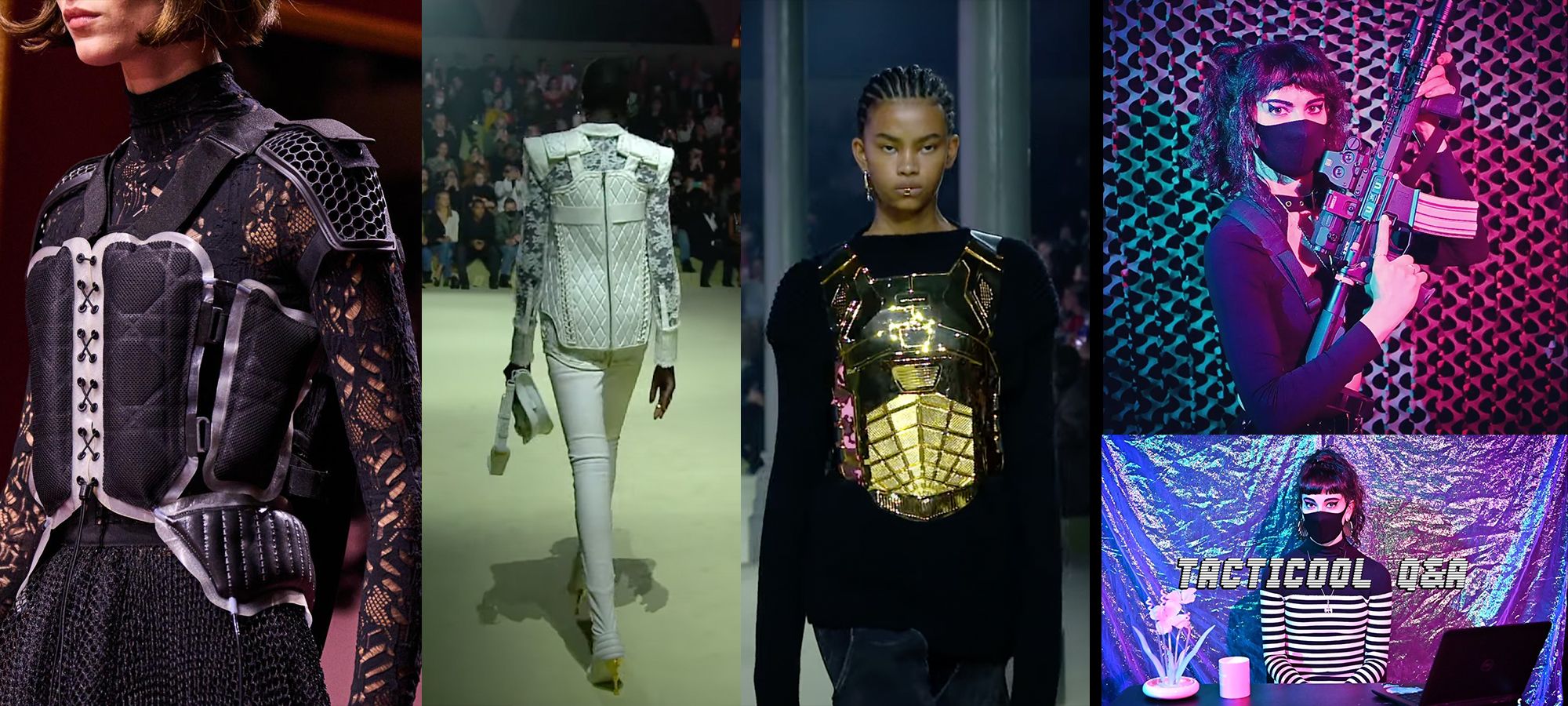
Where do the Psy-Ops end and the activism begin? Or has Psy-Op Realism consumed all possible media futures? More dangerously, can Psy-Op tools be implemented for left-wing emancipatory aims? The strategy of Dual Power became the telos of large liberation groups in the post-Occupy period. But, Jameson’s second provocation from American Utopia: the Universal Army is perhaps another vector. The idea is this, the military state is the closest thing to full socialism existing in American Capitalism by providing jobs, meaning, healthcare, to a mix of classes together under a unified structure. One route to communism in America could be to swell the ranks of the army until every person is a soldier. In this scenario, the Universal Army would result in a classless society as everyone is taken care of under the ethos of no soldier left behind. Jameson's book is kind of a trollish shitpost, but it helps to expand our thinking for left strategy and look beyond cultural political affiliations and use every structure for revolutionary action.
As Holly Jean Buck argues in After Geoengineering, we are going to need the level of labor activation, complexity of technology, infrastructure and global coordination that the Army can provide. As the window of possibility to long-term survival of life on earth contracts, the scale of possibility for life support systems exponentially dilates. The wildly improbable becomes seriously considered. In the past four years, China has begun Cloud Seeding and Solar-Radiation Management tests. The era of Geoengineering on earth is here (or always has been since the rise of industry). In 2021, The Pentagon declared climate change to be a top national security threat. Is it possible to mobilize the full might of the world's most sophisticated and powerful force towards a "Green New Deal" mission? People's Policy Project's plan for a "Green Tennessee Valley Authority" could be implemented tomorrow and began the cascade towards a carbon negative country. As incentives align, perhaps what is needed are Psy-Op campaigns targeted from within the military structure itself to change course away from the current necropolitics of weapons manufactures and security contractors and towards industrial scale carbon capture.
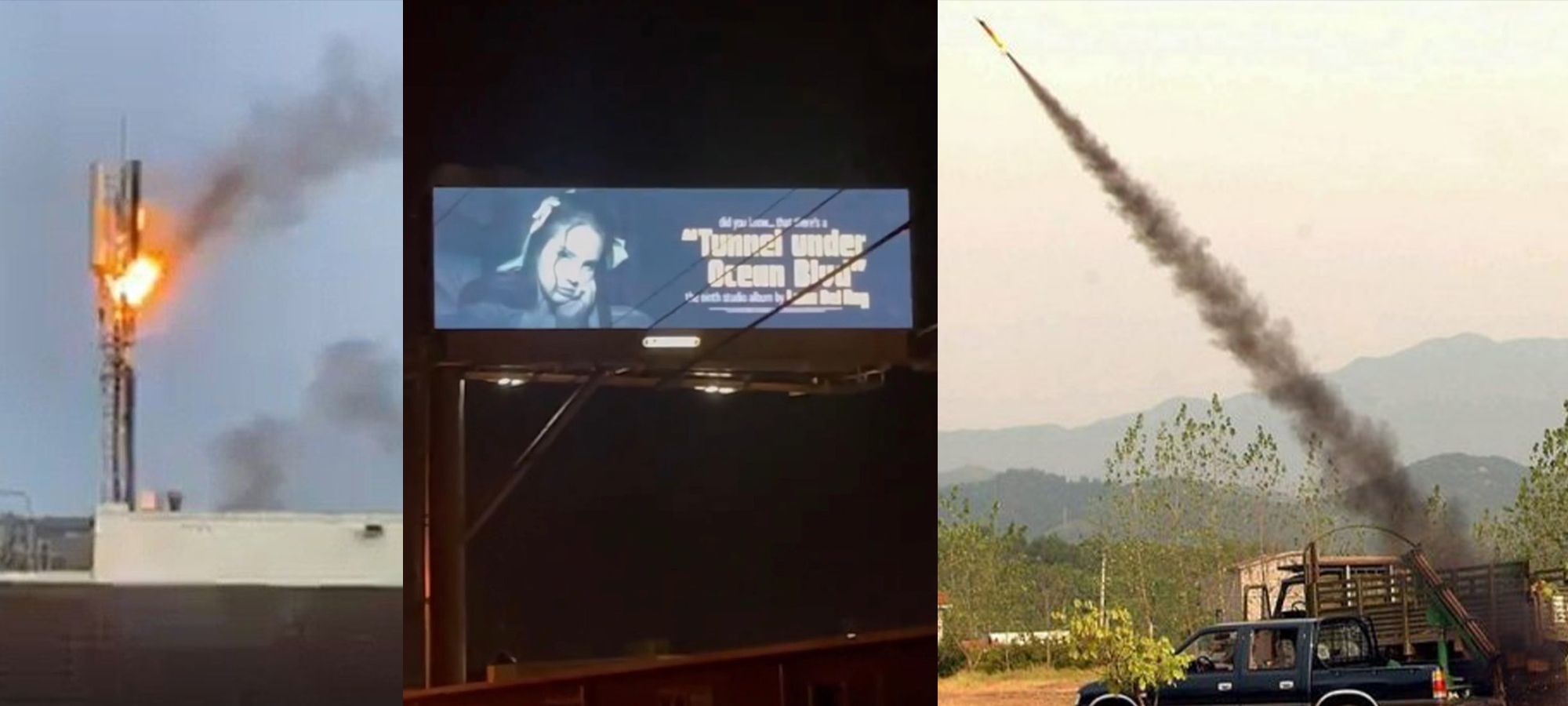
No matter what happens, Psy-Ops are here to stay, so we should get used to limited hangouts with avatars of power on social media. As advanced as the U.S. Military is, the Army's digital Psy-Ops are just now catching up to the effective reach and influence of Russia's program. "5G causes cancer (or is a mind control device)" is a story that is believed to have originated or was boosted by Russian Psy-Ops aimed at the west in order to slow development of a high-tech grid. The 5G conspiracy story has propagated throughout information space to the point that it has become part of mainstream culture. If there is one thing we should take away from the emergence of LunchbagLujan, it is that Psy-Ops are real and will continue to shape geopolitics, conflict and culture - memes are simply an early warning sign. As the intelligence community continues to operate with complete autonomy, we will need to reverse engineer the information we receive to parse out if agencies are pushing narratives and to what ends. Meanwhile, PR teams are running personalized Psy-Ops in order to promote new music releases, as with Lana Del Reys' single billboard campaign targeted at her ex and then seeded in press releases. The Psy-Op strategy is becoming granulated by social media dynamics that have created the perfect tools for influencing each other, we have all been turned into agents projecting overt and subversive messaging through our feeds. We Are All FEDs now. Stay vigilant and stay paranoid. You Have Been Fucked By a Psy-Op, Because Physical Wounds Heal.
Hailey Lujan did not respond to queries at time of publishing. Huge thank you to David Noel for so much context and insight that went into this piece. Thank you Günseli Yalcinkaya for sharing notes, read their piece on Dazed. K8 Howl for proofing and refining my takes. Betaverse podcast with [REDACTED] was incredible elucidating. Thank you everyone who sent me thoughts on IG. Subscribe to my E-newsletter for regular blog posts. And to unlock an archive of notable Lujan story posts below. - Jak
.
.
.
.
.
.
.
.
.
.
.
.
.
Below are a couple selections of screenshots and screen-records that I made over the past couple months. I have been survielling Lujan's account as a wrote this piece. I am attaching this archive in order to illustrate the post-ironic crossover that Lujan has attempted. All of this material was publicly posted and no personal details or doxxing is involved. These images and videos were retrieved from Oct-2022 to Jan-2023.

